Net Zero targets ‘offer huge opportunities’
Transport analyst Chris Cheek sees opportunity for enormous growth as efforts to reduce car use prompt modal shift towards public transport
Net Zero targets offer huge opportunities for bus operators from modal shift. That was the message from Chris Cheek to members of the Young Bus Managers Network at their meeting in Birmingham last week.
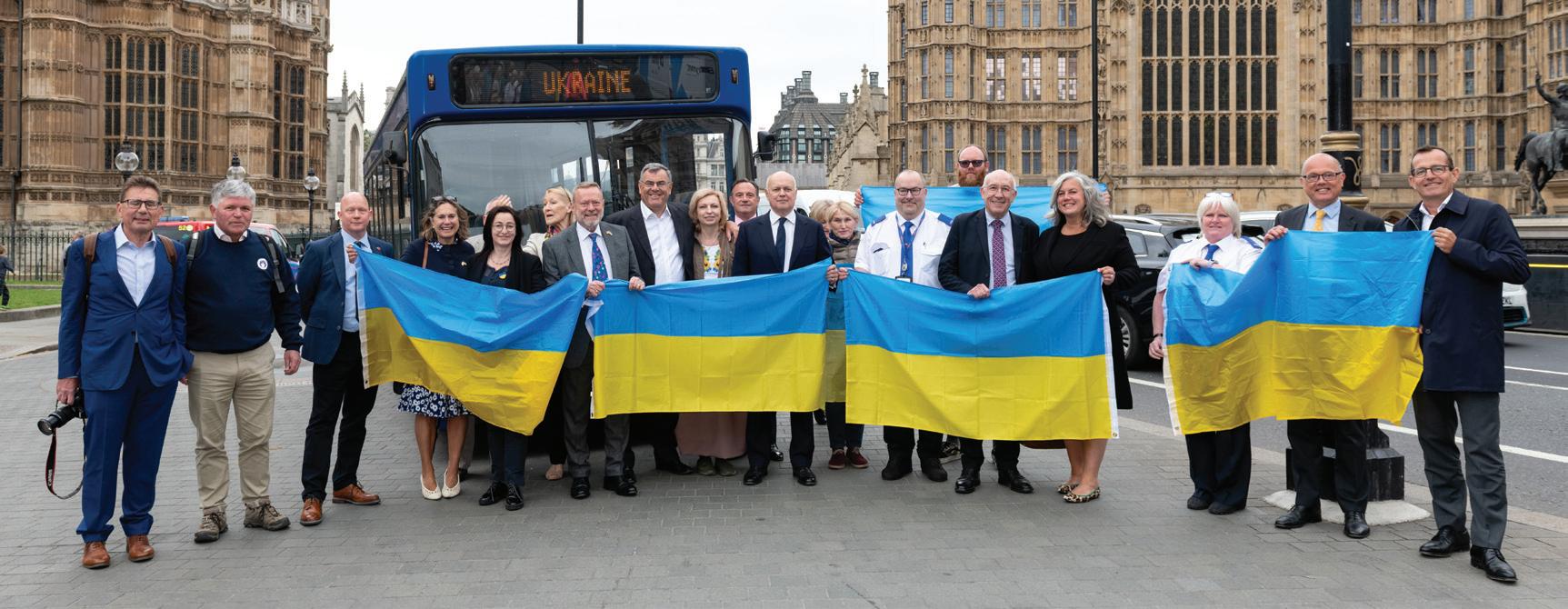
The transport analyst said that in 2019 534 billion kilometres were driven by cars, vans and taxis in Great Britain, and that equates, because of vehicle occupancy, to about 740 billion passenger kilometres. The UK Climate Change Act’s Sixth Carbon Budget assumes a 9% reduction in car miles by 2035 and 17% by 2050.
“The reduction targets mean you have to strip 66 billion
[car passenger] kilometres out by 2035, taking traffic back to 2001 levels, and 125 billion by 2050, taking it back to 1993 levels,” explained Cheek.
“So what would that mean for buses? A 9% switch [by 2035], which if it all came to bus - it won’t but it’s an interesting figure to mull over - would be a 203%
[bus] patronage increase. If it’s a 17% switch [by 2050], it would be a 384% increase in bus demand.
“I’ll leave you to think about where we get all the drivers to cover that. It is a huge challenge, but on the other hand, I think it’s a challenge we’d all rather have than the challenges of the last two or three years.”
Cheek added that each 1% of modal shift from car to bus could bring an 1.3 billion extra bus passenger journeys: “That’s the scale of the challenge and it’s the scale of the opportunity which might present itself to the industry over the next 10 to 15 years.”
Let’s
Norman Baker on
18 RIDE2RAIL boosts multimodal travel UITP-led project for seamless journeys
23
Alex Warner laments ‘idiotic’suggestion
ISSUE 290 2 JUNE 2023 NEWS, VIEWS AND ANALYSIS FOR A SECTOR ON THE MOVE
“You have to strip 66 billion kilometres out by 2035”
Chris Cheek
shout about public transport!
Better Transport
City’ will be ‘Public Transport City’
CONTINUED ON PAGE 9 making progress 04
Week 16 ‘Motor
Birmingham’s buses are
Wi-Fitheir brains are buffering!
Ditch
34 Zemo reflects on 20 years
COMMENT NEWS EXTRA COMMENT ROAD TO ZERO
Our 12-page special on the ‘Road to Zero’
SPECIAL REPORT FORTEVERY
HELP FOR UKRAINE A bus donated by Swindon’s Bus Company, part of the Go-Ahead Group, has been converted into a field hospital for use in treating casualties of the war in Ukraine. Go-Ahead boss Christian Schreyer, said: “I hope this bus will make a small contribution towards Ukraine’s war effort, and towards ... those injured on the front line.”
NIGHT
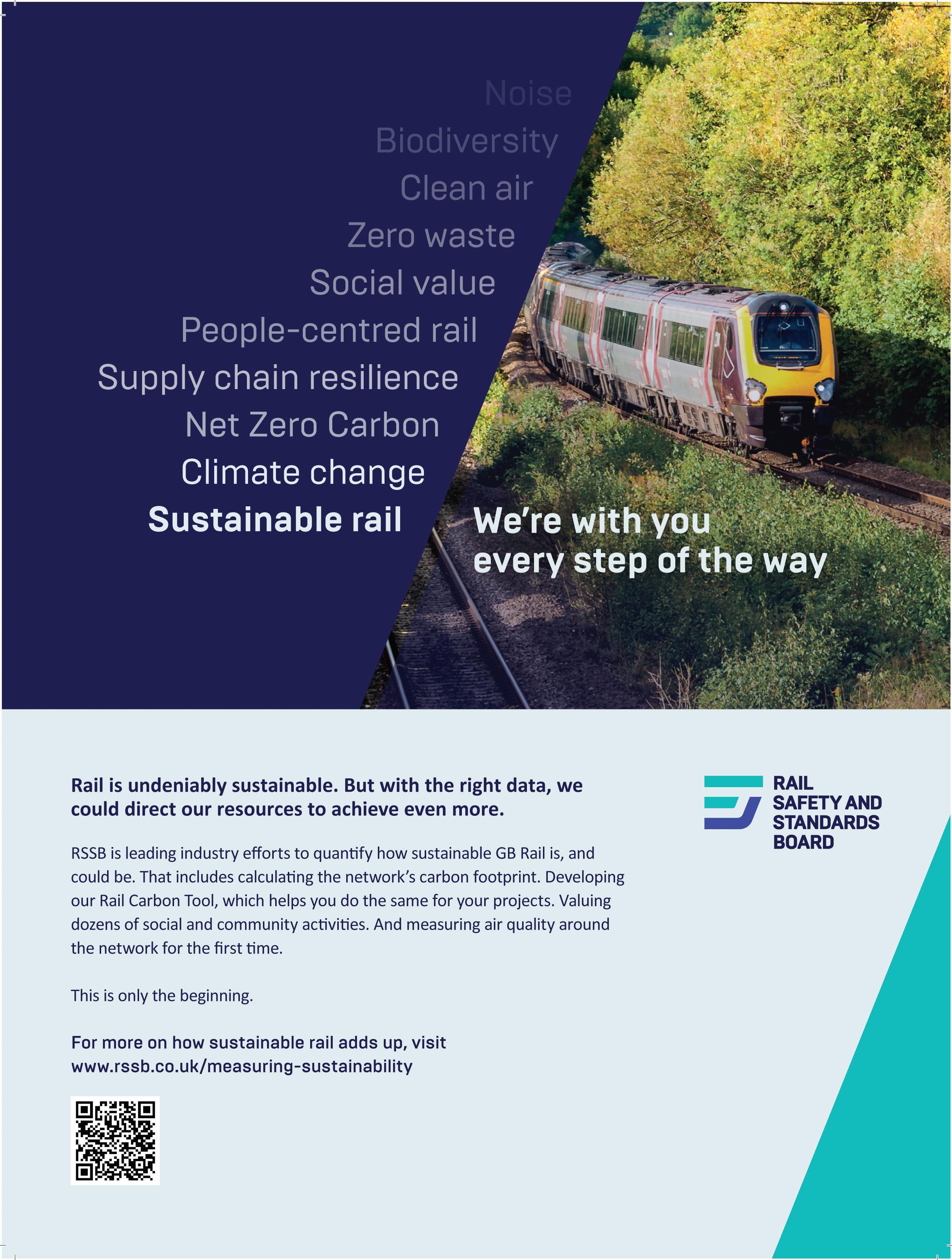
Crumbs off the car table could be a feast for us
As public transport battles to rebuild patronage in the wake of the pandemic and against a relentless tide of rising costs, it’s hard to imagine a world where its biggest problem might be keeping pace with demand. However, that is the world that transport analyst Chris Cheek foresees. Like many others in the sector, Chris has looked at the vast challenge of decarbonising the transport sector and he has concluded that public transport can and must be a major beneficiary. The UK Climate Change Act’s Sixth Carbon Budget assumes that around 9% of car kilometres must be reduced (e.g. through increased home-working) or shifted to lower-carbon modes (such as walking, cycling and public transport) by 2035, increasing to 17% by 2050. Even crumbs off the table of the 500-plus billion kilometres driven by cars, vans and taxis in Great Britain each year would be enough to cause public transport indigestion. As Chris points out, each 1% of modal shift from car to bus equates to 1.3 billion bus passenger journeys. Public transport operators see the opportunity that decarbonisation presents. Just look at National Express West Midlands (see pages 4-5) where progressive policies have pushed patronage ahead of expectations and electric buses are now seen as commercially viable. And see how Newport Transport is demonstrating that a mediumsized operator can be ambitious about transitioning to zero-emission buses (pages 29-30). The future is bright, if we can just make it there!
EDITORIAL editorial@passengertransport.co.uk
15
WOMEN IN R AIL AWARD W INNER
HullTrainsemergedasthe standout winnerattheprestigious Womenin RailAwards,securingthecoveted titleofTopEmployeroftheYear. Theawardreflectstheopenaccess operator’scommitmenttofostering aninclusiveworkforceculture.
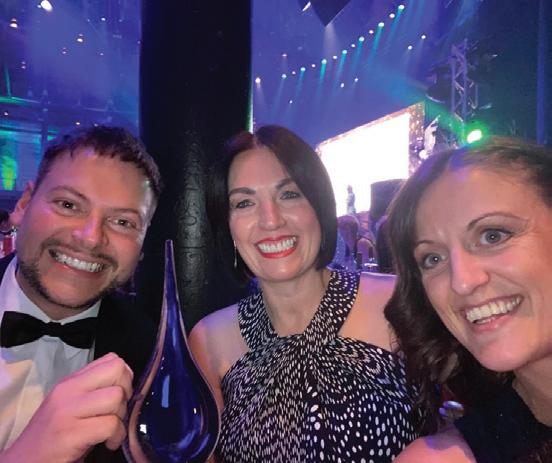
20
T HE HIDDEN COST OF ELECTRIC VEHICLES
Sourcingtheingredientsofan electricvehicle’sbatterydefineshow manycanbeproduced,butthere arealsootherchallenges,saysNick Richardson.“28,000tonnesofelectric vehiclebatterieswillneedtobe recycledintheUKby2030,”headds.
36 CAN
CARBON CAPTURE
CUT CLIMATE CHANGE?
Ifwewantalow-carbonbut moderneconomy,heavyinvestment inCarbonCapture,Utilisationand Storage(CCUS)isnecessary,but James Spencer warnsweshouldn’t losesightofthefactthatthereisno single‘silverbullet’fordecarbonisation.
37 N O TIME FOR A RAIL B ILL THIS AUTUMN?
forename.surname@ passengertransport.co.uk
Telephone: 020 3950 8000
Managing Editor & Publisher
Robert Jack
Deputy Editor Andrew Garnett
Contributing Writer Rhodri Clark

Directors Chris Cheek, Andrew Garnett, Robert Jack
ADVERTISING ads@passengertransport.co.uk
SUBSCRIPTIONS subs@passengertransport.co.uk
GreatMinsterGrumbles:OurWhitehall insiderimagineswhat’sgoingon insidethemindsofthemandarinsat GreatMinsterHouse,homeoftheDfT. Mediareportshavesuggested therewillbenoRailBillinthenext parliamentarysession.Whatnext?
REGULARS
ORGANISATION PAGE Arriva 11,12 ArrivaRailLondon 39 AvantiWestCoast 38 CampaignforBetterTransport 16-17 East-WestRail 7 FirstBus 1,31-32 Go-AheadGroup 1 GoNorthWest 8 GoviaThameslinkRailway 38 GreatBritishRailways 18-19,39 GreaterAnglia 7 HullTrains 38 JanusArchitecture 31-32 LeicesterBusPartnership 11 Lumo 40 LNER 18-19 NetworkRail 6,7,37,38,39 NewportTransport 29-30 NottinghamCityTransport 11 NorthernRail 38 NXWM 4-5,40 PelicanBus&Coach 29-30 PortsmouthCityCouncil 38 Southeastern 38 Stagecoach 8 StagecoachEast 8 Swindon’sBusCompany 1 TfWRail 7 Translink 15 TransPennineExpress 38 TransportforWales 12 UITP 34 UrbanTransportGroup 10 WomeninRail 38 Wrightbus 15 YoungBusManagersNetwork 1,4-5,9 Zenobe 29-30 ZemoPartnership 23-27 Robert Jack Managing Editor PASSENGER TRANSPORT editorial@passengertransport.co.uk
IN THIS ISSUE
Telephone
enquiries): 020
OFFICE CONTACT DETAILS Passenger Transport Publishing Ltd PO Box 5496, Westbury BA13 9BX, UNITED KINGDOM
(all
3950 8000
ACCOUNTS accounts@passengertransport.co.uk Passenger Transport is only available by subscription. Subscription rates per year; UK £140 (despatch by Royal Mail post); Worldwide (airmail) £280 The editor welcomes written contributions and photographs, which should be sent to the above address. All rights reserved. No part of this publication may be reproduced in whole or in part without the publisher’s written permission. Printed by Cambrian Printers Ltd, Stephens & George Print Group, Goat Mill Road, Dowlaid, Merthyr Tydfil CF48 3TD © Passenger Transport Publishing Ltd 2023 ISSN 2046-3278 SUBSCRIPTIONS HOTLINE 020 3950 8000 PASSENGER TRANSPORT PO Box 5496, Westbury BA13 9BX 020 3950 8000 editorial@passengertransport.co.uk CONTENTS www.passengertransport.co.uk 2 June 2023 | 03
NEWS 04 NET ZERO 15 COMMENT 16 ENERGY MARKET REPORT 36 GRUMBLES 37 CAREERS 38 DIVERSIONS 40 HAVE YOUR SAY Contact us with your news, views and opinion at: editorial@passengertransport.co.uk
Optimistic outlook despite the challenges

David Bradford told members of the Young Bus Managers Network that a public transport revolution is happening in the West Midlands
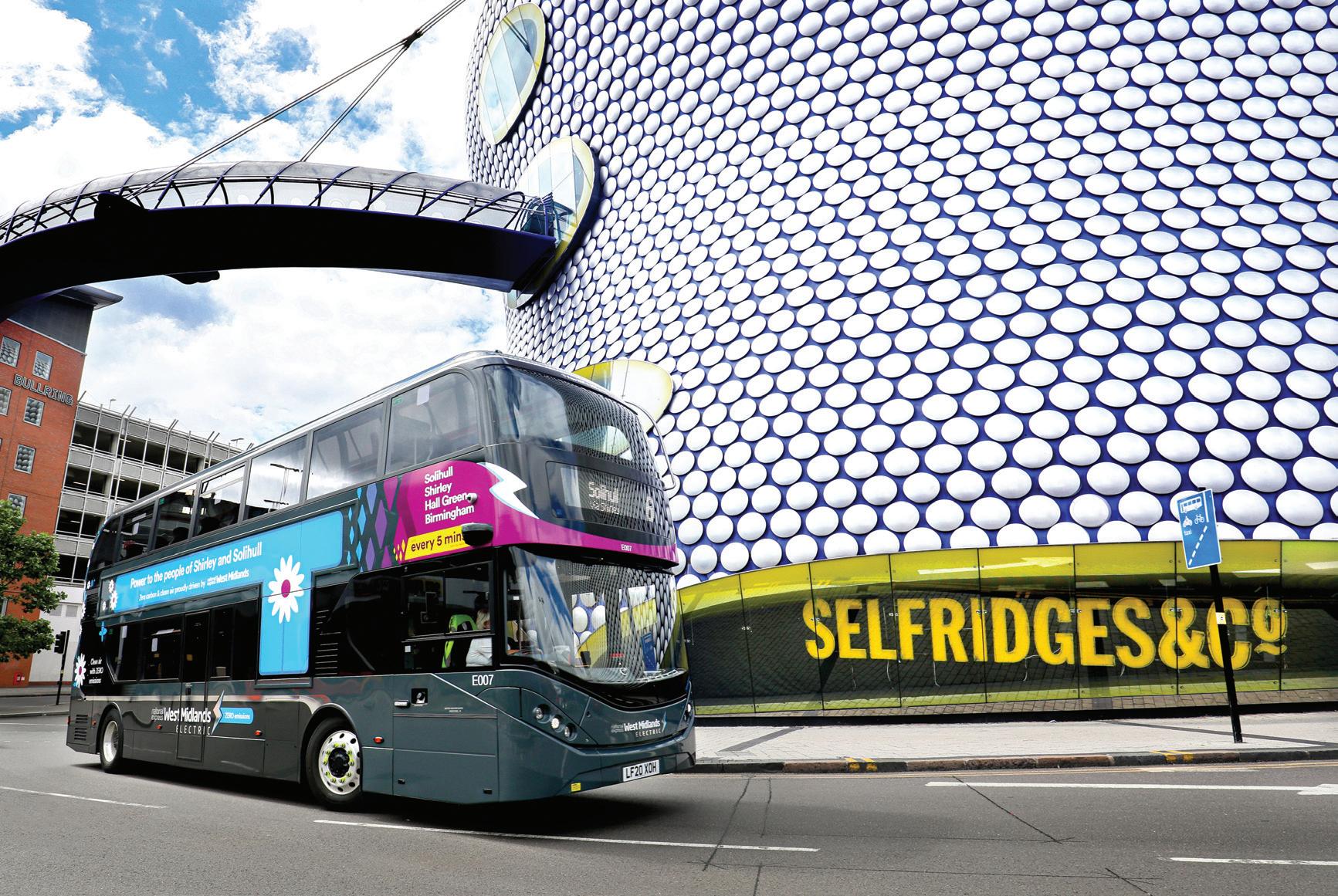
There’s no doubt that the bus industry has faced a tumultuous few years as a result of the shocks of not only the pandemic, but everything from rising inflation spiralling out of the war in Ukraine and Brexit. Despite the woes, David Bradford, managing director of National Express West Midlands (NXWM), remains optimistic.
Speaking at last week’s meeting of the Young Bus Managers Network (YBMN) in Birmingham, Bradford described his business - and the wider UK bus industry - as being at
something of a crossroads. Yes, the spectre of Covid looms large, but Bradford is optimistic about the future thanks to strong partnership working with stakeholders and progressive policies that prioritise public transport over cars.
He pointed to the multistorey car park behind his office in Digbeth that was recently demolished. It was one of the largest in Birmingham city centre and in its place and on adjoining land there will soon be 10,000 new homes. Not one of them will
feature a private parking space.
“We have the youngest city in Europe,” Bradford said. “Loads of young people are not buying cars and we’ve got car parks being torn down. The population of Bristol is going to move to the West Midlands over the next 10 years. There are going to be huge numbers of potential bus passengers moving to this region.”
While that may be in the future, he has other reasons to be optimistic in the short term as Bradford’s business is doing better
at encouraging more people back on the bus post-Covid than many of his peers.
“We’re hovering in the low to mid-90s of where patronage was at before the pandemic,” he revealed to YBMN members. “We’re better for commercial patronage but worse for OAPs, but the West Midlands is outperforming the national average. It shouldn’t be because we have more white-collar commuters where there’s a lot of home working, so we’re doing better than we should be.”
Those figures suggest that something is happening in the West Midlands. Research by NXWM has determined that 38% of people who live in the region have switched from car to bus for at least some of their journeys recently. Bradford thinks a lot of that is linked to affordable bus fares at a time when driving has become more expensive, but whatever is behind that change, he’s excited as it means public transport in the West Midlands is achieving the Holy Grail of modal shift.
That has been achieved by NXWM plotting a different course to many UK bus operators, some of whom have conducted radical surgery to their networks in a bid to make those post-Covid figures stack up. Today NXWM is running 90% of the services and mileage it did before the onset of the pandemic. Elsewhere that figure is closer on average to 80%.
“We’re running more of our pre-Covid network than most places are,” added Bradford. “It’s a spaghetti bowl - there are a lot of local services that are not necessarily busy or profitable, but feed into a wider network. If you cut it, it’s gone forever.”
He believes that reforming bus fares has played a vital part in building back patronage. In 2021
Bradford has a vision of Birmingham becoming ‘Public Transport City’ rather than ‘Motor City’
“Our commuter in the West Midlands is paying £600 a year for the bus. They would have been paying £850”
Andrew Garnett
NEWS EXTRA DAVID BRADFORD 04 | 2 June 2023 www.passengertransport.co.uk
Deputy Editor
as lockdowns loosened, NXWM announced big fare cuts.
“We’re very proud that we have the cheapest fares in England,” said Bradford. “We got KPMG to analyse it and they said it actually that grew patronage above what it would have been expected to be by about 9%. Revenue was slightly better... How long we can keep fares this low is a live debate, but we still need to keep them below inflation. Our commuter in the West Midlands is paying £600 a year for the bus. They would have been paying £850 if we hadn’t made that change [and cut fares].”
He said the commercial bus industry in the West Midlands had innovated and cut fares in a way that the state-owned rail industry and the bus industry in other places hadn’t.
Bradford continued: “It’s not about ownership - it’s about mindset and it’s about will. It’s very noteworthy that travel is a lot cheaper in the West Midlands. Our patronage is better, our recovery is better and we’re getting modal shift.”
Reforming fares takes another step forward next month when operators in the West Midlands
will make radical changes.
“We’re calling it the ‘bonfire of the bus tickets’,” said Bradford.
“If you catch a National Express bus service it costs one price; if you catch a Stagecoach service you need a different ticket. If you want both of them you can buy a multi-operator ticket, but that comes with a premium. All that complexity will get swept away.
“You’ll be able to use the same ticket on a National Express bus, a Stagecoach bus, a Diamond bus, or whoever’s bus. It is a risk tactically for National Express as we’re opening up our tickets, but strategically we need to make it simpler and easier for customers and we need to make the system feel more integrated. It’s a
calculated risk rather than a crazy risk. This is about making it very, very simple for the customer to understand.”
Bradford believes another area where the West Midlands is pulling ahead is on infrastructure. The first phases of the Sprint Bus Rapid Transit project were completed last year and the results are encouraging with journey speeds showing a 22% improvement and that is leading to patronage that is 16% better than on comparable corridors.
As Bradford notes, Sprint corridors are the gift that keeps on giving. They have been achieved as a result of the region’s bus alliance working closely with West Midlands mayor Andy Street and local councils.
“Birmingham City Council is a Labour-run council and Andy Street is a Conservative mayor, but we all work together,” said Bradford. “The council in Birmingham are visionary and they are bold; they are literally ripping down car parks and reprioritising road space. Very, very brave and very, very bold. It is making a difference. Their vision for Birmingham is no longer
Compelling case for zero-emission buses
NXWM finds vehicles are outperforming business case
David Bradford said that zero-emission buses are driving patronage increases at National Express West Midlands and the economic case for their introduction was now more compelling than ever. He revealed on routes where electric and hydrogen buses have been introduced, the operator is seeing 4% better patronage,
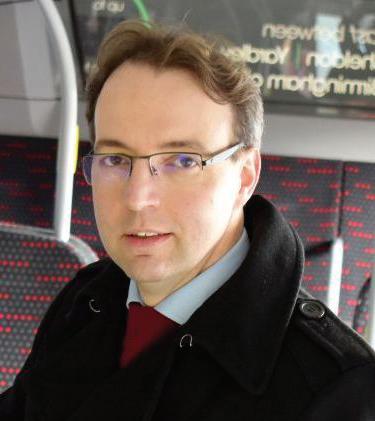
7% higher customer satisfaction and four times fewer accidents and harsh braking incidents. The vehicles are also outperforming all of the elements of the business case on costs and efficiency.
“Our electric buses are excellent,” he said. “Drivers like them, engineers like them, the accountants like them and the passengers like them. There is
no initiative we have done that has been so popular with all of those groups, which is why we’re buying loads more.
“We don’t need government funding for electric buses any more. The business case is just so good, so we’re doing it without grant support and we’ve bought 300 more. We think the business case is really working in the West Midlands. It may not work elsewhere, but for us it does.”
Bradford added he expected half of the operator’s fleet to be zero-emission within two years.
‘Motor City’ - it is going to be ‘Public Transport City’.”
Despite this optimism, there have been stresses and strains for NXWM and that has come to a head over the last year with driver shortages and a well-publicised industrial dispute.
“I could do my ‘everything is awesome’ routine, but actually, not everything has been awesome,” he admitted. “Our performance hasn’t been good enough.”
He revealed the operator had been losing about four or five per cent of mileage on a routine basis through parts of last year as a result of a shortage of staff. However, instead of implementing cuts, NXWM decided to maintain the network while acknowledging that some areas would experience a worse service sometimes.
Bradford described this strategy as spreading the pain rather than concentrating the pain, but he admitted it was “not a great place to be running a poor-quality service”. Thankfully the recruitment pipeline is now looking more encouraging and Bradford is hopeful NXWM will be on a more even keel in July. Meanwhile, performance has also been hampered by an all-out strike earlier this year; since resolved with drivers receiving a significant pay rise. While he didn’t hold any grudges against the settlement, he emphasised that it highlighted the harsh economic reality of operating buses.
Bradford continued: “You can’t give drivers 20% rises, you can’t have fuel price increases, utility price increases etc without somebody paying for it. There is just a fundamental economic problem, a structural problem in the industry.
“Whether it’s franchised or whether it’s run privately, the same problem applies.”
David Bradford
www.passengertransport.co.uk 2 June 2023 | 05
“Birmingham is no longer ‘Motor City’ - it is going to be ‘Public Transport City’”
Rail reliability to fall as renewals scaled back
Network Rail anticipates a decline in rail network reliability in Control Period 7 due to infrastructure delays resulting from scaled-back renewals
INVESTMENT
Network Rail expects reliability on the rail network in England and Wales to decrease as a result of infrastructure delays driven by the scaling back of the renewals process according to its Strategic Business Plan for Control Period 7 (2024-29).

“We expect a decrease in asset reliability in CP7, given the way we have had to prioritise and allocate available funding to deliver our objectives,” admitted Network Rail. “Whilst we have sought to focus on train performance, we have had to balance our expenditure and
asset interventions in order to protect safety, as well as focusing investment on those areas which will bring the highest economic and social benefits.”
EXPENDITURE AND INCOME PLANS: CP6 AND CP7
Source: Strategic Business Plan for Control Period 7 (2024-29), Network Rail
The change of focus will see spending on renewals fall during Control Period 6 from £15.9bn to £15.8bn in CP7 across the four England and Wales Network Rail regions. At the same time maintenance spending will increase in those areas from £9.4bn in CP6 to £9.8bn. The infrastructure controller continued: “Our affordabilitydriven approach to renewals expenditure in CP7 will have a small impact on asset condition and infrastructure reliability, particularly in the latter years of the control period and will result in the increased need
for maintenance activity and operational restrictions so that safety outcomes can be protected.”
The impact on reliability is expected to lead to a 2% overall increase in ‘service affecting failures’ with the Wales & Western region most affected with an 8% increase in service affecting failures when compared to CP6. The Southern region will see a 3% increase on the same metric.
Network Rail admits this scaling back of the renewals process is likely to lead to further issues in Control Period 8 as maintaining the same level of performance achieved in CP7 will be difficult due to the expected workload.
The choice will have to be made between accepting a decline in asset condition and an increase in associated risk to asset performance in CP8 and beyond or increasing the volume of work to preserve the same level of asset performance as in CP7.
“These decisions will be highly dependent on the funding and deliverability context at the time,” said Network Rail. “Maintaining CP7 exit levels of asset performance in the long run will be challenging from a funding and deliverability perspective, and likely prohibitively disruptive to our customers, but we also recognise that it will be important to take action to redress asset condition in CP8 and beyond. We therefore consider that it would take two control periods to achieve this (CP8 and CP9).”
*Includes ‘contingent’ risk of £1.48bn in CP7. All prices at 2023-24 prices
Assuming this action is taken, renewals would require around £17.5bn in CP8 and £19.8bn in CP9, growth of £1.8bn and £4.0bn from CP7 funds respectively. “By doing this we would expect to achieve a stasis position from CP9 where we hold the profile of remaining life in our assets,” Network Rail noted.
NEWS ROUND-UP 06 | 2 June 2023 www.passengertransport.co.uk
EXPENDITURE CP6 CP7 VARIANCE Operations, maintenance and support £18.24bn £18.81bn +3.1% Renewals (core asset renewals and other capital expenditure) £18.39bn £18.22bn -0.9% Group risk £0 £0.50bn n/a Post-efficient OMSR total* £36.63bn £37.54bn +2.5% Industry costs and rates £1.53bn £1.67bn +9.5% Traction electricity (EC4T) £2.64bn £4.06bn +54.0% ETCS enablers £0 £0.81bn n/a Post efficient total expenditure* £40.80bn £44.08bn +8.1% Post efficient total expenditure (exc. EC4T)* £38.16bn £40.02bn +4.9% INCOME CP6 CP7 VARIANCE Passenger track access charges -£7.11bn -£7.18bn +1.1% Station and depots charges -£2.97bn -£3.02bn +1.6% Freight and open access track access charges -£0.48bn -£0.46bn -4.8% Property and other income -£1.96bn -£1.73bn -11.8% Schedule 4 and 8 (inc. access charge supplement) £0.23bn £0.07bn -66.9% Traction electricity charges -£2.64bn -£4.06bn +53.7% Network grant -£25.85bn -£27.7bn +7.1% Total income -£40.80bn -£44.08bn +8.1%
Renewals spending of £15.8bn is planned for CP7
Network Rail abandons Piccadilly expansion
Focus moves to £72m regional upgrades that will enhance capacity
INVESTMENT
Network Rail has abandoned plans for two new platforms at Manchester Piccadilly station with the government instead announcing a £72m investment in regional upgrades that aim to alleviate congestion.
The decision to withdraw the planning application for the extra platforms came after ministers deemed the plans were not cost-effective and would not deliver capacity enhancements to passengers fast enough.
Instead, the focus will shift to constructing a third platform at Salford Crescent station and track improvement works in north Manchester to tackle delays and
GREATER ANGLIA BANS E-SCOOTERS
Move made as a result of battery fire risks
SAFETY
Greater Anglia is to ban the carriage of e-scooters on all trains across its network, following concerns over potential risks to passenger safety. It means most National Rail operators have now banned carriage of e-scooters on their services.
Greater Anglia head of safety, security and sustainability Matt Wakefield said: “We know that e-scooters have battery packs which vary greatly in quality. The decision has therefore been made to ban these items due to recent incidents elsewhere and the risks associated with faulty lithium batteries.”
overcrowding. Additional entry and exit points will also be created at Manchester Victoria station to alleviate overcrowding.
“This new investment will help make train services more reliable for the people of Manchester and beyond, marking another milestone in a decade’s worth of rail improvements across the region,” said rail minister Huw Merriman.
But Greater Manchester mayor Andy Burnham was critical of the shift of emphasis away from the planned expansion project at Manchester Piccadilly.
“On the one hand we’ve got a good announcement as far as it goes… but on the other side of the city we’ve got again confusion and uncertainty,” he told Manchester Evening News. “What we need is a coherent plan for the railways in
EAST WEST PLANS MOVE
FORWARD
Southern approach to Cambridge now favoured
PROJECTS
city centre Manchester.”
Ministers have requested the Manchester Task Force, a cross-industry body including representatives of Network Rail, Transport for Greater Manchester, Transport for the North and train operators, to explore alternative options “that better serve passengers and support the £26m already injected to improving services at Manchester Piccadilly, Airport, and Oxford Road stations”.
“Combined with ongoing electrification projects and the TransPennine route upgrade already underway, the latest measures will pave the way for an enhanced timetable from the middle of the decade and the introduction of future HS2 services into the city,” added the Department for Transport.
Augmented reality maps for TfW Rail
Move aims to give confidence to passengers
INNOVATION
Augmented reality maps of six of Transport for Wales Rail’s biggest stations have been created to help passengers feel more confident when using the rail network.
It is hoped the AR maps can be used to assist passengers who may be nervous about travelling, such as those visiting a station for the first time or people with mobility issues.
The interactive maps can be
used to locate key areas in the stations including customer information screens, lifts, toilets, help points and waiting rooms.
Created by indoor wayfinding company Briteyellow, the first six maps to be created are of Cardiff Central, Cardiff Queen Street, Newport, Chester, Shrewsbury and Pontypridd.
“These maps will enable customers to plan their journey through the station prior to their visit,” said Michael Davies, insights and innovation manager at Transport for Wales.
Long-awaited plans for rail services linking Oxford, Milton Keynes and Cambridge have moved a step closer with the publication of the latest proposals for East West Rail (EWR).
Constructon of the railway between Bicester and Bletchley is already well underway and tracklaying passed the halfway mark earlier this year before passenger services between Oxford and Milton Keynes begin in 2025. Plans for the rest of the route have been updated following feedback from the second non-statutory public consultation.
The updated proposals include route alignment into Cambridge that prioritises the Cambridge Biomedical Campus. This will entail an alignment that approaches the city from the south, a move EWR claims has the potential to unlock significant economic growth.
A new station is planned near Tempsford that will improve connectivity with EWR services and the East Coast Main Line. New tracks will be laid in Bedford that aim to protect the reliability of services on the Midland Main Line. Bedford residents will also see reduced travel times by up to 40 minutes for those travelling to Milton Keynes and Cambridge while design changes have reduced the number of homes in the town affected by the project.
The strategic business case for the project has also been updated to consider ways in which the benefits of EWR can be delivered at a lower cost to the taxpayer.
“Quick, reliable public transport linking Oxford and Cambridge continues to have widespread local support and our updated proposals have been shaped by the hundreds of conversations,” said Beth West, EWR’s chief executive.
www.passengertransport.co.uk 2 June 2023 | 07
“What we need is a coherent plan for the railways”
Stagecoach UK boss to step down this summer
Carla Stockton-Jones to leave group after three years in post
PEOPLE
Stagecoach has announced that Carla Stockton-Jones, the group’s UK managing director, is to step down from her role later this summer.
Confirming the move, a Stagecoach spokesperson said: “Stagecoach’s UK managing director, Carla Stockton-Jones has announced that she will be leaving the business at the end of August to seek new growth opportunities outside of Stagecoach.
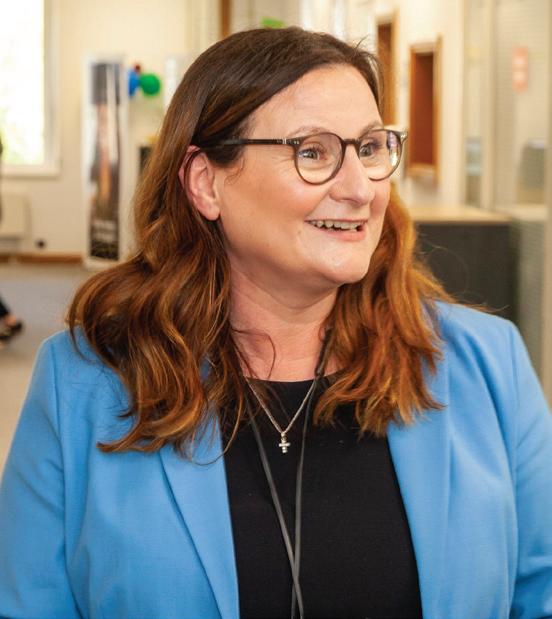
“Carla was appointed as UK managing director in October 2020, having joined the company as regional director for the South of England in February 2020 having held senior roles at Sky.”
WANTED: 300 BUS DRIVERS
RECRUITMENT
Go-Ahead subsidiary Go North West has kicked off what it claims is Britain’s biggest ever recruitment campaign for bus drivers ahead of the launch of the franchised Bee Network in September.

The company plans to hire up to 300 drivers for a newly created Elite Bus Driver Academy. Themed as ‘Be an Elite Driver’, the campaign uses fighter pilot-style uniforms and imagery, and makes existing drivers the star of the show.
The images of eight drivers will be emblazoned across a fleet of buses to highlight the campaign.
Informed sources have suggested to Passenger Transport that her decision to leave the group may have been influenced by Stagecoach’s purchase by private equity player DWS Infrastructure last year. With the group now solely focused on its UK bus operations following the loss of its remaining rail contracts and the sale of its overseas
operations in recent years, the appointment of Ray O’Toole as a hands-on executive chairman could have influenced StocktonJones’s decision to move on.
Earlier this year Stagecoach announced the departure of former chief executive Martin Griffiths and chief financial officer Ross Paterson in a move the group said reflected its transition from listed PLC to private equity subsidiary.
Stockton-Jones joined Stagecoach just weeks before the onset of the Covid-19 pandemic that saw bus patronage in the UK fall off a cliff. She has been instrumental in a company-wide reorganisation that has seen new technologies and working practices introduced and management teams streamlined.
Stockton-Jones also suggested
at a meeting of the Young Bus Managers Network last year she had been struck by discussion in some quarters about her suitability for her role (PT263).
“I’ve had many people tell me I shouldn’t be in this industry as I’m not from this industry, or that I don’t know enough about this industry, but I’ll tell you what I do know - I do know what makes people tick and I do know how to serve customers really well,” she said.
She also claimed that, in her view, her gender had also played a part in some of that commentary: “The fact that I’m the first woman to run a [multimodal] public transport business in the UK - I don’t see that as anything special for me.
“I think it’s a bonus. The industry benefits from having more women, helping to bring more diverse thinking into how we run our organisations and bringing more diverse thinking so we can serve our customers better.”
GOOD NEWS FOR STAGECOACH EAST
Operator reveals patronage growth in Cambridgeshire
NETWORKS
Stagecoach East has revealed that patronage on 12 Cambridgeshire bus services has increased by as much as 37% in recent months.
Darren Roe, the operator’s managing director, said Stagecoach East had invested extra resources in the services following its controversial network review that saw a number of services axed last year.
“It’s great to see that this latest investment is paying off and, along with the discounted fare scheme, more and more people are taking the bus to stay connected in our region,” he added.
Stockton-Jones will leave in August
Go North West kicks off Bee Network recruitment
Fighter pilot-style imagery used in campaign
NEWS ROUND-UP 08 | 2 June 2023 www.passengertransport.co.uk
Switch to franchising ‘won’t stop rising costs’
Cheek warns costs will increase whatever the regulatory model

REGULATION
Local authorities seeking greater control of their bus networks must realise that franchising will not solve the growing costs involved with mainstream bus operation.
Speaking at last week’s meeting of the Young Bus Managers Network in Birmingham, transport analyst Chris Cheek said that although franchising gave authorities greater control over their bus networks, it was not policy tool that would prove to be a magic bullet in the long term. He continued: “It won’t stop rising costs. It won’t stop increasing congestion. It doesn’t avoid the need for the operator to make a profit and indeed in franchising the profit is baked into the contract, regardless of how the network performs
commercially. Ultimately if everything goes wrong then it’s the local taxpayer that pays.”
He said that franchising would transfer the revenue risk to the public sector and this would prove costly to administer for many local authorities. “Its costs public money that they don’t have,” Cheek added.
He continued: “One of the
crucial things is that it breaks the link between operator and customer.
You are in a situation where the frontline staff know that their wages get paid regardless of whether they carry anybody or not. There is no incentive for operators to grow the market, and there are grave risks in all that going forward.”
NET ZERO TARGETS ‘OFFER HUGE OPPORTUNITIES’
Cheek said he was sure many were sceptical such a level of modal shift could be sustained, but he said the targets were enshrined in law meaning something would have to give.
“There’s also growing public pressure to do something about [climate change], and I don’t just mean pressure from militant organisations like Just Stop Oil,” he added. “It’s a generational thing, so the public pressure to do something proper to address Net Zero and the climate change emergency is growing.”
However, he warned that at present there wasn’t any clear strategy from government to deliver the change that was needed. “There is also, I think, little public understanding of the scale of what we need to do to make this happen,” Cheek said.
“There is this continued portrayal about any of these measures that we need to take as a war on the motorist.”
Government must solve rural bus issue
Industry must insist goverment acts for the long term
The issue of rural bus services and their future was at the centre of a lively debate at last week’s meeting of the Young Bus Managers Network in Birmingham. Industry analyst Chris Cheek admitted it was a difficult issue and one that people had raised continually throughout his career. He continued: “In the end I
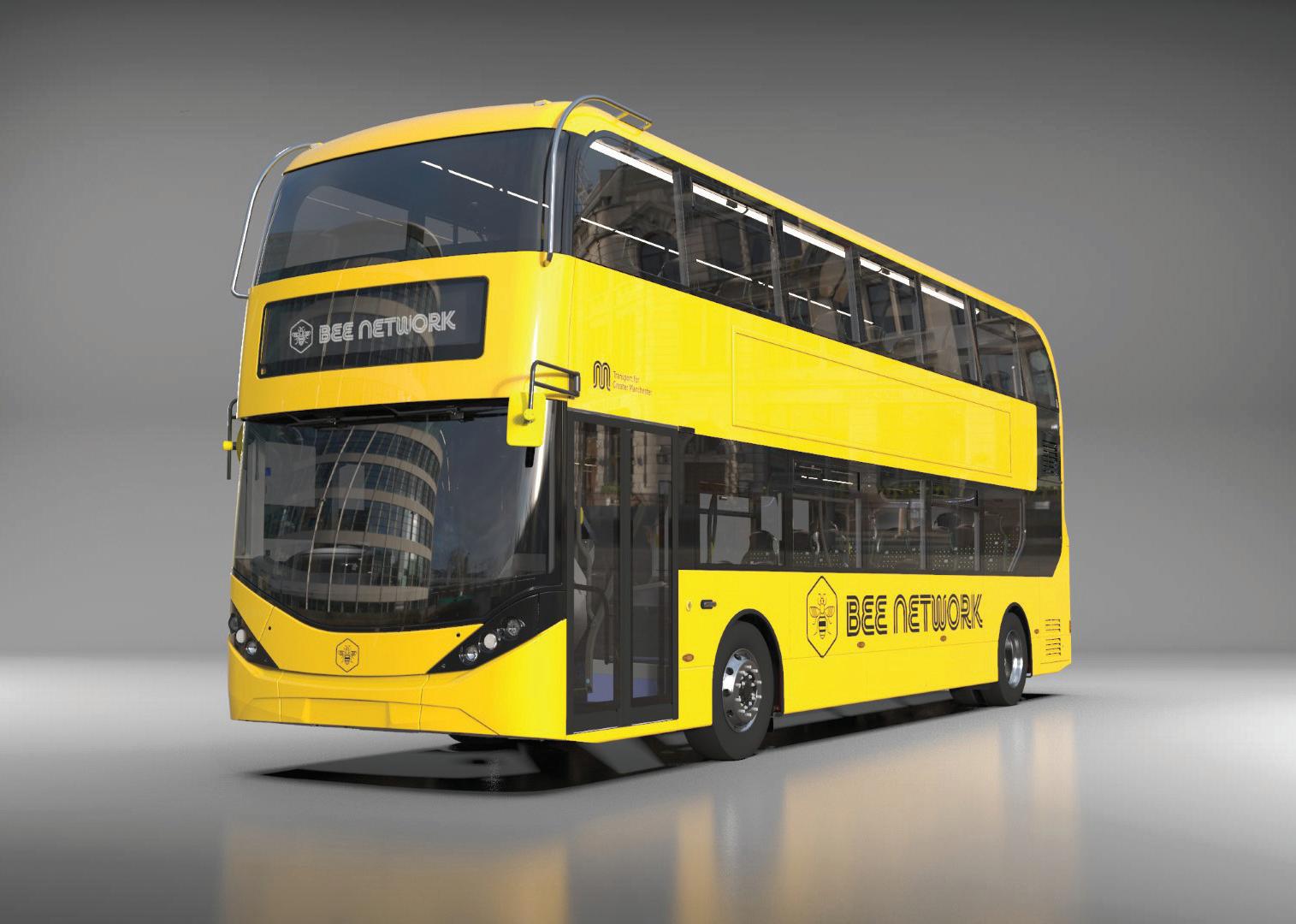
think, and I’m not sure that we say this enough as a commercial industry, actually, it’s not our problem. Most rural buses will never be commercial, so we’ve got to say to government, ‘you’ve got to come up with a solution to the problem’ and that means committing to spending money in the medium and long term which they are never prepared to do.
“They are only ever prepared to commit to three years. They come up with really good ideas and at the end of three years, the spotlight moves on and they think, ‘Oh, well. It was nice while it lasted’.”
Cheek labelled some of the current crop of demandresponsive transport schemes as “incredibly expensive” and pointed to one rural transport scheme in the late 1990s where it would have been more cost effective to buy each passenger who used the service a car.
Continued from Page 1
Bus franchising will begin in Greater Manchester in September
Chris Cheek
“There’s growing public pressure to do something”
www.passengertransport.co.uk 2 June 2023 | 09
Chris Cheek
Initial BSIP+ funding allocations announced
New stream could offer revenue support for local bus services
FUNDING
A total of £80m has been allocated as part of the new Bus Service Improvement Plan Plus (BSIP+) funding to 63 local transport authorities (LTAs) across England.
The allocations are part of the government’s longer-term strategy to support bus services until April 2025. Ministers have confirmed that BSIP+ will provide local authorities and operators with revenue funding to protect services up to April 2025. The £300m allocated will be split into two pots for 2023-24 and 2024-25. In each year £70m will go to operators via the BSOG+ scheme with £80m going to LTAs to improve buses and “make local decisions on protecting services” as they see fit via BSIP+.
Under this scheme 15 LTAs have failed to win any funding, but the Department for Transport has said all received funding as part of the BSIP process in 2022. A total of 18 LTAs will receive support from both schemes, although of the 12 recipients of the largest BSIP sums, only two will receive BSIP+ funding.
Essex County Council has received the largest allocation with funding worth £4.9m under BSIP+. Other big winners include Surrey County Council with £3.9m while West Yorkshire Combined Authority tops up its £70.0m previous award with £3.9m of fresh funding.
However, although the BSIP+ scheme has been welcomed, fears
have been raised about whether the funding will be adequate to protect services in the future.
Tom Ellerton, the Urban Transport Group’s technical manager, warned in a blog post that the BSIP+ funding is below the level of the previous Bus Recovery Grant scheme.
He continued: “Added to this,
not all areas have been allocated local authority funding, with many of the combined authorities missing out based on their previous BSIP allocations.
“What’s worrying is that BSIP funding was initially set out to transform our bus networks in line with the national bus strategy, Bus Back Better, with strict rules
on how the funding must deliver a ‘step change’ in bus services. We will now see significant chunks of BSIP funding moved to protect services and ensure that service reductions are kept to a minimum.
“This leaves us with the question of what happens to the national bus strategy given that we are now in a world where it is less about providing ‘services so frequent that you don’t need a timetable’ and more about ensuring that areas still have a bus service at all.”
LTA BSIP+ ALLOCATION Essex County Council £4,890,976 Surrey County Council £3,923,922 West Yorkshire CA £3,875,221 Hampshire County Council £3,579,462 Sheffield City Region CA £3,151,353 Liverpool City Region CA £3,119,118 Cambs and Peterborough CA £2,314,172 Kent County Council £2,301,397 Lancashire County Council £2,247,177 Gloucestershire County Council £2,209,623 Lincolnshire County Council £2,120,280 Wiltshire Council £2,115,269 Warwickshire County Council £2,072,248 Cornwall Council £1,969,162 Suffolk County Council £1,878,427 Leicestershire County Council £1,788,514 Devon County Council £1,677,393 Tees Valley Combined Authority £1,529,477 Shropshire Council £1,490,492 Hertfordshire County Council £1,488,381 North Yorkshire County Council £1,463,688 Worcestershire County Council £1,429,686 Staffordshire County Council £1,327,673 Buckinghamshire County Council £1,310,333 Cheshire West and Chester Council £1,291,071 Nottinghamshire County Council £1,210,428 Cheshire East Council £1,187,596 East Riding of Yorkshire Council £1,141,576 West Sussex County Council £1,102,400 Oxfordshire County Council £963,741 Herefordshire Council £952,037 Dorset Council £884,221 LTA BSIP + ALLOCATION Cumbria County Council* £876,873 Plymouth City Council £816,563 Medway Council £768,780 Hull City Council £756,530 Somerset County Council £737,079 Leicester City Council £727,289 West Northamptonshire Council £687,109 Milton Keynes Council £654,193 Telford and Wrekin Council £650,938 Southampton City Council £639,575 Bournemouth, Christchurch and Poole Council £617,511 North Northamptonshire Council £569,412 North Lincolnshire Council £547,379 Bedford Borough Council £546,757 Blackpool Council £506,488 Southend-on-Sea Borough Council £479,250 Blackburn with Darwen Borough Council £470,171 Nottingham City Council £445,022 Royal Borough of Windsor and Maidenhead £437,116 Thurrock Council £432,857 Swindon Borough Council £415,830 Torbay Council £403,923 Wokingham Borough Council £401,322 Central Bedfordshire Council £350,457 Slough Borough Council £343,267 Bracknell Forest Council £325,716 Derby City Council £323,606 Isle of Wight Council £290,025 North East Lincolnshire Council £280,128 Rutland County Council £253,280 West Berkshire Council £239,039
* Allocation to be split between Cumberland and Westmorland and Furness Councils
NEWS
10 | 2 June 2023 www.passengertransport.co.uk
2023-24 BSIP+ ALLOCATIONS
ROUND-UP
Leicester partnershiphighlightsprogress
Delivery on track for 100 improvements by summer next year
PARTNERSHIP
An alliance amongst local bus operators and stakeholders in Leicester claims to have made significant improvements since its launch last year.
Launched in May 2022, the Leicester Bus Partnership, a collaboration between local bus operators and Leicester City Council, aimed to enhance bus travel by focusing on making it electric, reliable, frequent, easy, and cost-effective. Out of the 100 planned improvements to be implemented by 2025, 75 have already been delivered, with the remaining on track to be completed by summer 2024.

Achievements during the first year include the introduction of contactless ticketing with bestvalue fare capping for daily and weekly trips and the introduction
A FAMILY AFFAIR AT MUNICIPAL FIRM
Retirement marks family’s 122 years of service at NCT
PEOPLE
Nottingham City Transport has said a fond farewell to Karen Allen who has retired from her role at the operator’s travel centre, concluding an impressive 42 years of service. Her retirement also marks the end of a remarkable legacy at the council-owned bus operator, with the Allen family collectively contributing 122 years to NCT, dating back over 90 years to 1932. Allen’s grandfather was the first family member to join
of six ‘Greenline’ routes operated with electric buses, including the free Hop! city centre circular service. The city centre St Margaret’s Bus and Coach Station has been built, over 600 real-time displays and 450 new bus shelters installed at key bus stops, and bus services have been optimised to remove duplicated routes and timetables coordinated.
Meanwhile, discounted bus
tickets have nbeen introduced for jobseekers, park and ride users, eligible pupils, and health workers. Bus priority has been enhanced with new bus lanes into the city centre and on major corridors. A new comprehensive website has also been launched to provide ticketing and service information for all bus operators in the city.
Further improvements are
planned with more bus priority measures in the pipeline and 86 new electric buses scheduled to come on-stream with First Leicester. Arriva will introduce 24 zero-emission vehicles on key routes and by the end of the year it is anticipated that half of all bus travellers in Leicester will be travelling on zero-emission vehicles.
“Despite the lack of government funding, Leicester City Council Enhanced Partnership has achieved some excellent results in just its first year,” said Dawn Badminton-Capps, chair of the Leicester Bus Partnership Forum.
“The board and its partners will continue to build on this success and strive to deliver the best services possible for Leicester’s buses.”
Mike Watson, who recently joined First Bus as interim MD for the Midlands and South Yorkshire, said it was a privilege for First to be involved in the partnership. “It shows what can be achieved with a combination of exceptional civic leadership, highly-skilled officers and collaborative industry partners,” he added.
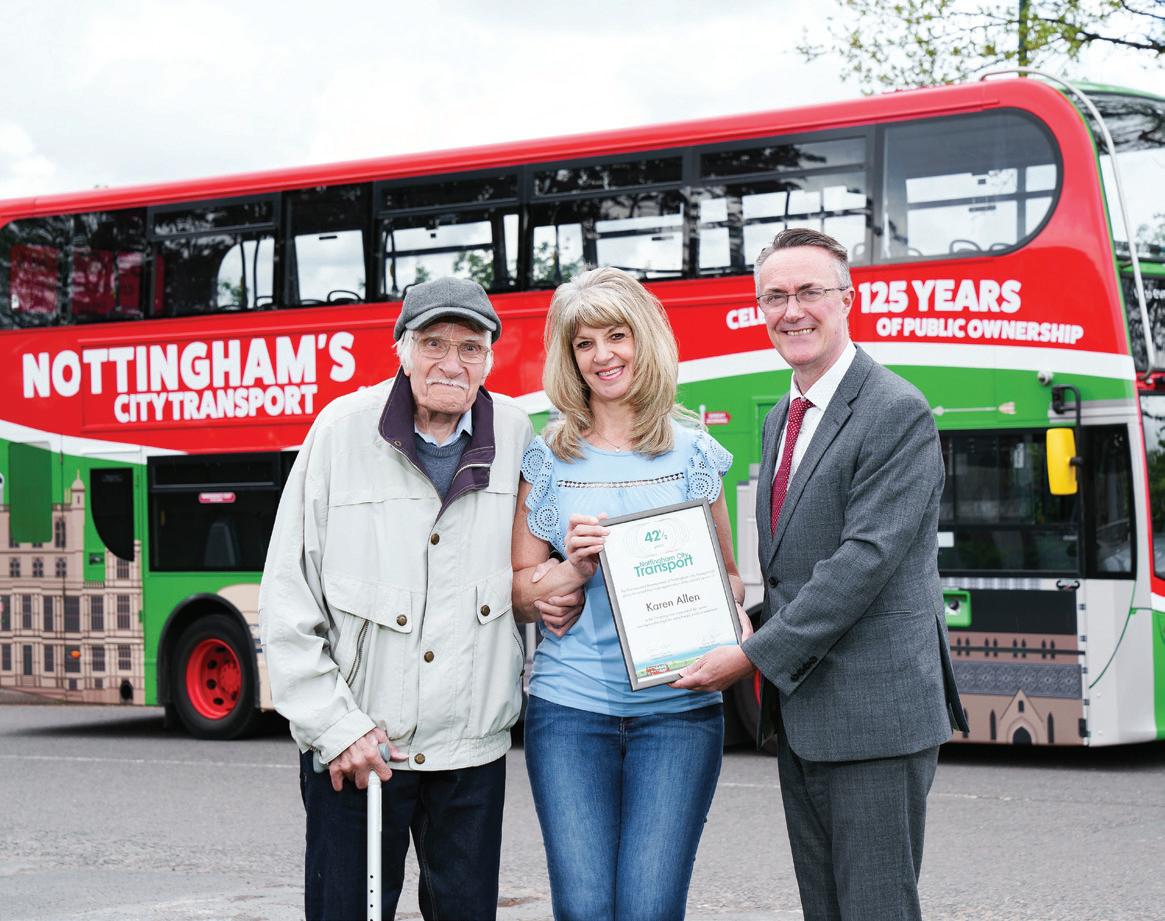
NCT, commencing his career as a bus driver in 1932. Following World War 2, he transitioned to the engineering department, where he served as a panel beater for 22 years.
In 1941, her uncle became a blacksmith at NCT, dedicating 24 years to the company. Subsequently, her father followed suit, joining NCT in 1955. Bernard Allen spent 26 years in the engineering department as a coachbuilder and trimmer.
“I congratulate the Allen family on a phenomenal achievement and hope that Karen has a retirement in duration to match that of 91-year old Bernard,” said David Astill, NCT’s managing director.
Family ties: Bernard Allen (left) and Karen Allen with David Astill
Partnership was launched in May 2022
www.passengertransport.co.uk 2 June 2023 | 11
“Despite the lack of government funding, Leicester City Council Enhanced Partnership has achieved some excellent results”
Welsh operators hold key to bus networks
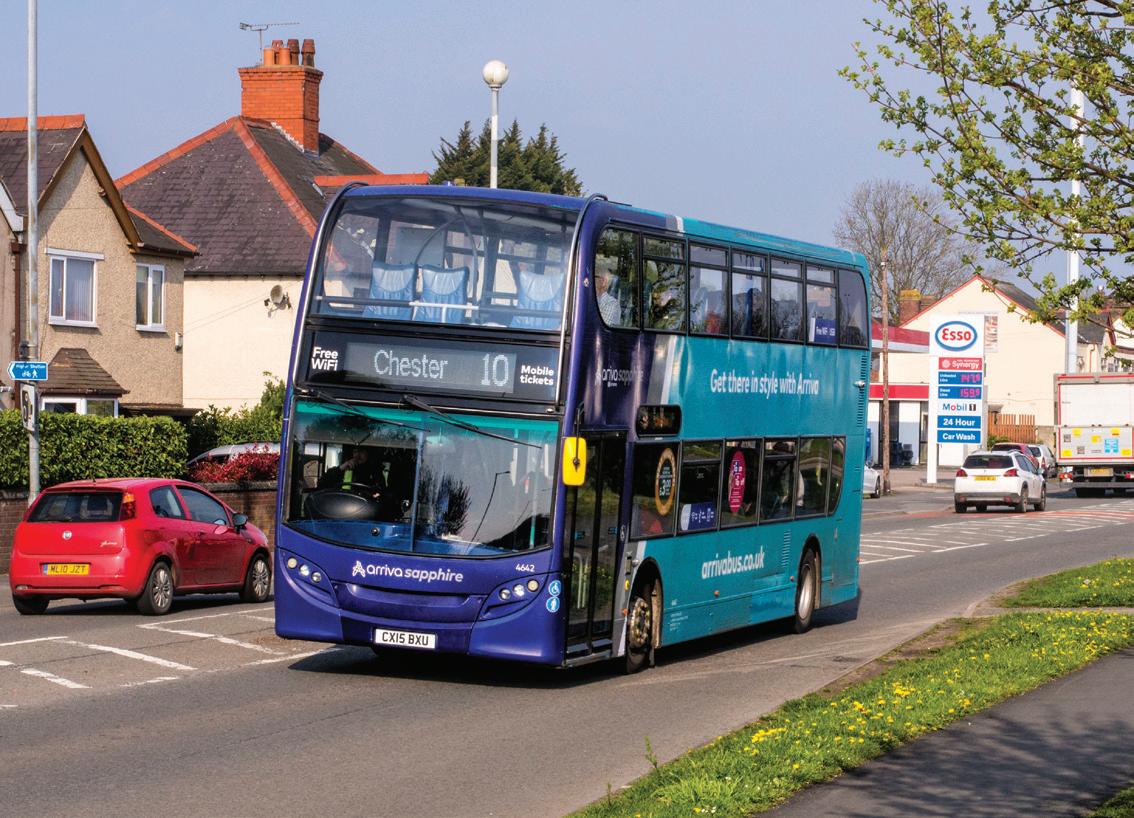
Deputy climate change minister told Senedd that operators would be at the heart of the work to reshape networks, with TfW in a supporting role
NETWORKS
The Welsh Government has recognised that it must work with bus operators to reshape networks around current patterns of demand, as well as removing the July cliff edge in emergency funding.
Three years ago, the government gave Transport for Wales the task of drawing up new networks for each region with the aim of ensuring the public funding spent on buses achieved the desired outcomes. TfW commissioned consultants to provide research and advice, but some people in local government and the bus industry felt that their own expertise and local knowledge had been overlooked.
In a statement to the Senedd on May 25, deputy climate change minister Lee Waters made clear that this time around, operators would be at the heart of the work to reshape networks, with TfW relegated to a supporting role.
He said the government had “agreed to set up regional planning teams, supported by TfW, to work with bus companies to establish which services would be viable without additional financial aid, and what routes are the priority for the funding that we are able to make available”.
He continued: “These teams have been working hard in partnership with us and the industry to reach a solution for bus services, and they’ve made significant progress in reviewing the networks in their areas and
finding ways to make them better reflect new post-Covid travel patterns.”
The planned ending of the Bus Emergency Scheme (BES) in July had caused great concern to operators, local authorities and politicians. At a Senedd committee session last month, two North Wales politicians said they had heard that Arriva was poised to announce the closure of three depots, which would be “devastating” (PT289).
There was relief when Waters announced in his statement: “We have nearly reached a solution that will allow us to make further funding available to protect as much of the network as we can for the remainder of this financial year. This needs to be a more sustainable solution, with a network that reflects changing travel patterns and helps us make the transition to franchising.
“The Welsh Government will
make £46m available from bus budgets to support BES and successor arrangements for the whole financial year, as well as to keep our strategic TrawsCymru services running.”
This is additional to the Bus Services Support Grant, which has been frozen at £25m per annum since it was established in 2013 as the Welsh successor to the Bus Service Operators Grant.
During the debate that followed his Senedd statement, Waters said: “I’ve just announced that we’ll be putting an extra £20m on the table. There remains a gap. We don’t have the exact figures yet, and that’s what we’re working through.
“These are very complicated things to disentangle, because the money that’s given to local authorities to fund concessionary fares is done in arrears when we know the actual spend that’s taken place and we aren’t able to
reconcile those figures in real time. So, we have to wait until the full picture has emerged. We’ve done some excellent work with them to try and look at efficiencies, and we’ve managed to reduce the burn rate of concessionary fares and the BES significantly as a result of that system.”
He also promised a “campaign to get people back on buses” once the services had been placed on a stable footing.
Scott Pearson, chair of the Coach and Bus Association Cymru, welcomed the announcement and the “transparent recognition from the minister that more work is required to get this period of essential bus funding over the line”. At the recent committee session, he had warned that reshaping networks required 12 months to two years, not the three months which had been allowed when the government announced in March that BES would end in June.
After the statement, Pearson commented: “It was heartening to hear the cross-party support from the Senedd floor for the bus industry in Wales and we hope this support flows into a long term financial settlement for the bus industry to avoid these challenges in the future. CaBAC looks forward to playing a full and constructive role in further discussions on bus funding in the longer term.”
Arriva appears to have shelved the depot closures the politicians had referred to. It welcomed Waters’ statement and said it would work with the government and local partners “to establish together which routes are the priority for the funding that will be made available where the cost of running services can’t be covered by the numbers of passengers using them”.
12 | 2 June 2023 www.passengertransport.co.uk NEWS ROUND-UP
Depot closures shelved?: An Arriva bus in Shotton


First of Derry’s 38 electric buses unveiled
Translink, the public transport operator in Northern Ireland, has revealed the first batch of electric buses for its Foyle Metro services in Londonderry
INVESTMENT
Translink has unveiled the first of its electric buses for Foyle Metro services in Londonderry. The 38-vehicle electric fleet, supplied by Wrightbus, will be in operation later this year, making Derry one of the first cities in the British Isles with a fully zeroemission urban bus network.
The Department for Infrastructure denied that the 38 vehicles represented a reduction in the numbers previously announced. In December 2020, it announced a contract for 45 low-emission vehicles for Ulsterbus services, along with 100 zero-emission vehicles which “will be deployed between Metro in Belfast and Foyle Metro services in Derry”. All of the new buses were due to be in service during 2021/22.

In November 2021, the DfI announced a further £30m to make Foyle Metro zero carbon. Nichola Mallon, then the infrastructure minister, said: “My Department previously allocated funding of almost £74m for the purchase of 145 zero and low emission buses for the Translink fleet. I am delighted today, at COP26, to announce additional funding of £30m for the purchase of 38 new zero emission battery electric buses for the Foyle Metro fleet which will allow Derry to have a fully zero-emission bus fleet when all the vehicles go into passenger service in 2023.”
Passenger Transport asked the DfI what had happened to the buses for the Foyle Metro which it announced in December
2020. A DfI spokesperson said: “The Department has provided significant investment to Translink for Zero Emission Vehicles (ZEV) and Low Emission Vehicles (LEV). The investment announced in 2020 was to provide 100 ZEV across the entire Metro fleet, with no final decisions at that time as to the exact locations.
“The subsequent investment in 2021 has enabled the entire Foyle fleet - all 38 buses - to become electric. There has been no removal of electric vehicles from Foyle Metro. The remaining 100 ZEV will be utilised within Belfast
Metro.”
Passenger Transport also asked how the Foyle Metro could be impacted by the standstill budget the UK Government has allocated to the DfI for this year (PT289). The spokesperson replied: “The 2023-24 Resource and Capital Budget allocations for the Department for Infrastructure do not meet the required need and, despite taking decisions to reduce expenditure and raise revenue, there remains a resource shortfall which is estimated to be £112m. The Department is working closely with Translink on
the consequences of the budget outcome.”
The Foyle Metro investment includes installation of 22 electric vehicles chargers at Pennyburn garage, sufficient for 44 buses to charge sequentially overnight. The infrastructure includes future proofing for 19 additional bus charging stations.
The vehicles, a mix of single and double deckers, have high-back e-leather seats and a new audiovisual passenger information system which includes screens mounted overhead in the central aisles. Enhanced safety features include external cameras in place of wing mirrors. The buses have an innovative new bus sound system (Acoustic Vehicle Alerting System) to enhance road safety when travelling at slower speeds in cities, since the vehicles are relatively silent.
Ian Campbell, Translink’s director of service operations, said: “Transport has a significant role to play in tackling the climate crisis. This project supports Translink’s vision to reduce greenhouse gas emissions by 50% by 2030 and operate a zero-emissions fleet across Northern Ireland by 2040 - all of which is vital for tackling the climate emergency and driving change for a better quality of life for future generations.
“More people making the switch to cleaner, greener public transport and active travel will help deliver a better future for our people, our planet and our prosperity.”
Wrightbus CEO Jean-Marc Gales said: “Our electric buses - the GB Kite Electroliner BEV and the StreetDeck Electroliner BEV - are manufactured and assembled at our Ballymena factory, which means support for jobs in Northern Ireland and wider across the UK through our domestic supply chain.”
NET ZERO www.passengertransport.co.uk 2 June 2023 | 15 ???
“This project supports Translink’s vision to operate a zero-emissions fleet across Northern Ireland by 2040”
Ian Campbell, Translink
NORMAN BAKER

Let’s shout about public transport!
This year marks the 50th anniversary of the Campaign for Better Transport, and what better way to mark that milestone than by devoting a week to a celebration of all that is good in public transport.
The charity was set up in 1973, with help and encouragement from the National Union of Railwaymen (NUR), now morphed into the RMT. The catalyst was the plan for a Beeching Mark 2, which would have slashed the network even beyond what Beeching did. Fortunately for us all, that dangerous idea was headed off, and the independent and well-respected charity has been working to promote sustainable transport, especially rail, bus and light rail, ever since.
Campaign for Better Transport, the country’s biggest transport charity and the only one that covers all modes, was originally called Transport 2000 but the passage of time forced a change, actually into a more positive name. The charity was not alone, of course, in being tied to a year. There was Thameslink 2000, which carried on well into this century, but in that case, the use of a specific date was more of an embarrassment. It is perhaps fortunate there is no year attached to HS2.
A huge amount of change in the transport world has of course happened in the last 50 years, including bus deregulation, and on the railways privatisation, and then a bewildering succession of bodies that have come and gone including the terrible Railtrack and the not so terrible Strategic Rail Authority.
But in general terms, the politicians and the public are now more favourably disposed towards public transport than they were in 1973, when the general assumption was the car was the future, rail was yesterday’s mode of travel, and anyone who was still on a bus when aged over 25 was a failure in life.
That last quote is attributed to then prime minister Margaret Thatcher, not least by The Economist, who dated it to 1986, the time of bus deregulation. It is not entirely clear if she actually uttered the words, but that is almost irrelevant. It certainly fitted her view.
The same might be said of “crisis, what crisis”, creatively but wrongly attributed to her predecessor as PM, Jim Callaghan, and indeed “Elementary, my dear Watson,” words never uttered as a phrase by Sherlock Holmes, and likewise “Play it again Sam,” in the film Casablanca.
There are, I believe, two events that arrested what was seen as an inevitable decline in the railways. One was the renaissance of the Carlisle-Settle railway line in the mid-1980s. Here was a line that had seen cut after cut
to try to save costs, leading to the inevitable downward spiral with eventual closure as the terminus.
But a spirited campaign successfully argued that the opposite approach was the way forward: reopen closed stations, breathe new life into the line. Nowadays the line is thriving, not least of all as a vital freight route, and any suggestion of closure is now a long way back in the rear view mirror.
Saving Carlisle-Settle also served to bring to an end the prevailing mindset that the network would inevitably contract. It killed off the Beeching mentality once and for all. Now, of course, we are busy (though not busy enough) reopening stations and lines that should never have been closed, and redoubling track that should never have been singled.
This, incidentally, is an object lesson for today’s pen pushers in government who are busy suggesting cuts to make the railway more sustainable financially. Take the bonkers idea that Wi-Fi should be switched off on trains. Numbers are still below pre-Covid levels so let’s make the offer to the passenger less attractive! That should work....
The second, and even more totemic event, was the creation of a wonderfully updated St Pancras station, officially reopened in 2007. For years, the rail industry had almost been ashamed of rail. At Euston, the magnificent arch was removed, and at Victoria, the platforms were hidden away behind retail units.
Now at St Pancras, for the first time in decades, the railway industry offered a powerful and confident statement about its future and its place in society. It produced a wonderful architectural achievement, seamlessly blending the old and the new. A classy remake at King’s Cross has followed. Rail believes in itself again.
So in rail, there is much to celebrate, 50 years on. Light rail too has seen a renaissance with schemes up and running in many of our major cities, though not yet in Leeds or Liverpool. But back in 1973, the trams and trolleybuses had long slipped into history, leaving only the Blackpool tram, then seen as some sort of quirky tourist attraction.
In the bus, we still have the means of public transport that carries most people, yet despite innovation from the private sector, and support from the public sector, including stout support from the government since Covid, routes have
Better Transport Week is a chance to celebrate the good work and enthusiasm from those involved in delivering public transport
16 | 2 June 2023 www.passengertransport.co.uk COMMENT BETTER TRANSPORT WEEK
“Politicians and the public are now more favourably disposed towards public transport than they were in 1973”
“Let us learn the lessons from Carlisle-Settle, and from St Pancras and King’s Cross”
been lost and passenger numbers have declined. A further round of service cuts seems likely. Yet there are positives. There is more commitment to the bus in government at national and local level than at any time in my memory, there is a resilience among the bus operators and a determination to make things work, and a service that is much valued by its users.
And so to Better Transport Week, a new concept but one which Campaign for Better Transport has in mind to make an annual event in the calendar. The idea has been widely welcomed by government, with participation from ministers at key points, by industry, by other campaign groups, and by the public at large.
Each day will have a theme: Monday for rail, Tuesday for bus and coach, Wednesday for light rail and local transport, Thursday for health, Friday for engagement with business.
The week kicks off on Monday 12 June with a gathering in the well of King’s Cross station, featuring the rail minister Huw Merriman and the great and the good of the rail industry. In the afternoon, there is a roundtable discussion on the future of rail, held at the RIA offices in London. GBR-TT, Eurostar and Trainline amongst others will contribute.
More widely, “love your station” events will be taking place at various locations.
On Tuesday, the main action switches to Nottingham where the buses minister
Richard Holden will be meeting the bus driver of the year, and there will be an event involving Nottingham City Transport, the well respected independent Trentbarton, and National Express, who have recently launched new coach routes, including one linking Derby, Nottingham and Leicester. Across the country, people are being encouraged through social media to get involved and to “thank your driver”, and to tell the charity why the bus is important to them.
Meanwhile Campaign for Better Transport’s chief executive Paul Tuohy will be in Brighton, a success story for the bus industry where passenger numbers are growing. He will meet both Brighton and Hove Buses, and the sparky independent Big Lemon.
On Wednesday there is a roundtable in Manchester, which has a big appetite for transport innovation, and an event to celebrate light rail, Light Years Ahead, with a visit to the test track at Dudley. There are also events in Birmingham and London.
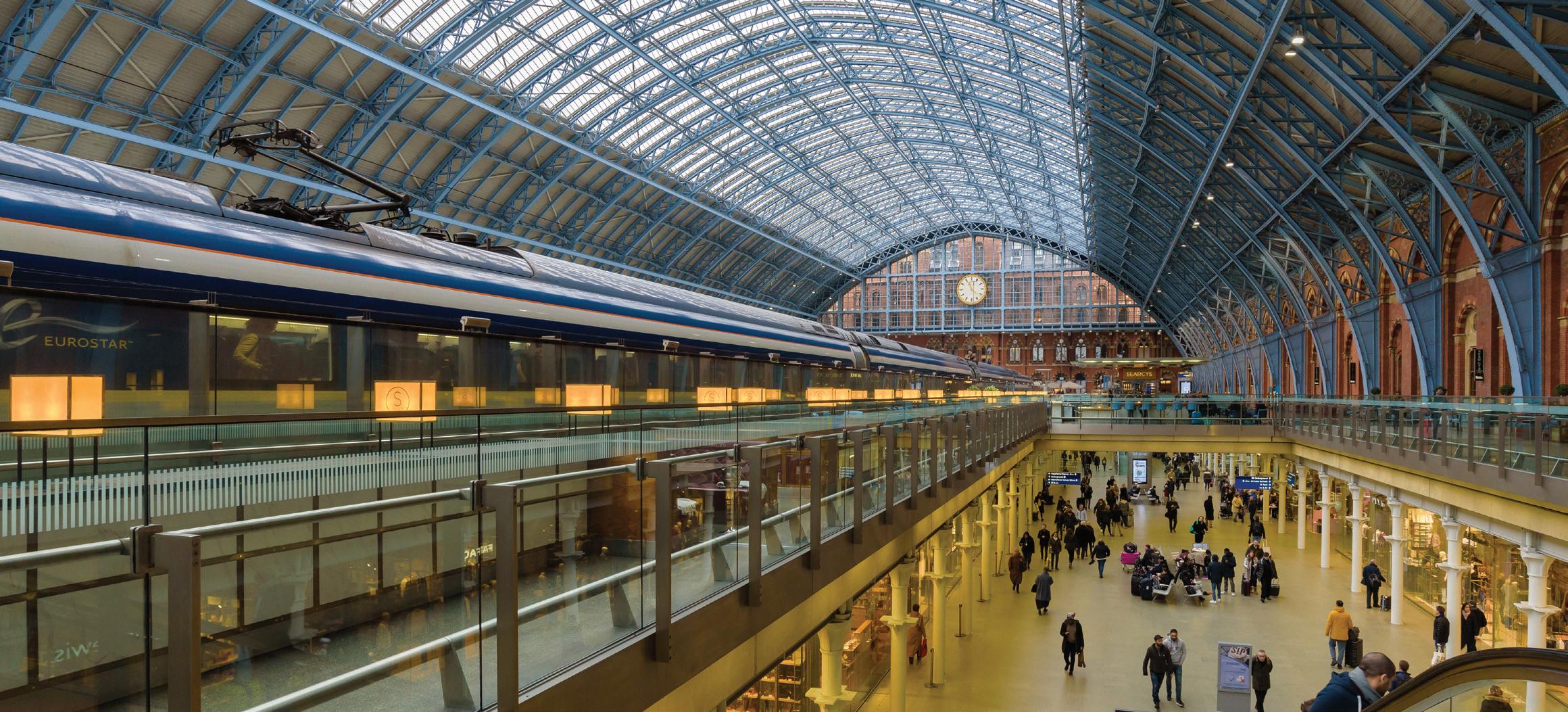
There is in addition an opportunity to win a prize through a “ride to rail” challenge, linking two forms of sustainable transport.
On Thursday, which is Clean Air Day, the charity will be in Aldwych in London to launch a paper which highlights the role public transport, through modal shift away from cars, vans and lorries, can play in improving air quality and so lessening the impact on the NHS.
On Friday, there is the launch of a business toolkit to encourage good practice within businesses in the transport choices they make. There is more! But space constraints mean I can only give you the highlights.
The overall message is clear, however. There is a great deal of good work and enthusiasm from those involved in delivering our public transport services, and that should be celebrated.
Of course there are challenges: the changes to working and shopping practices that Covid has generated, or at least accelerated; the ongoing industrial disputes on the railway; the acute shortage of cash at local authority level; and the general backdrop of a squeeze on household budgets with inflation roaring away and wages lagging behind. And a few more besides.
But for a week at least let’s put these behind us and be positive about all the good aspects of our great public transport industry.
Let us learn the lessons from Carlisle-Settle, and from St Pancras and King’s Cross. Let us shout about what is good about public transport and show we believe in it. That can become infectious.
ABOUT THE AUTHOR
The creation of a wonderfully updated St Pancras station, officially reopened in 2007, offered a powerful and confident statement about the future of the railway and its place in society
www.passengertransport.co.uk 2 June 2023 | 17
Norman Baker served as transport minister from May 2010 until October 2013. He was Lib Dem MP for Lewes between 1997 and 2015.
ALEX WARNER
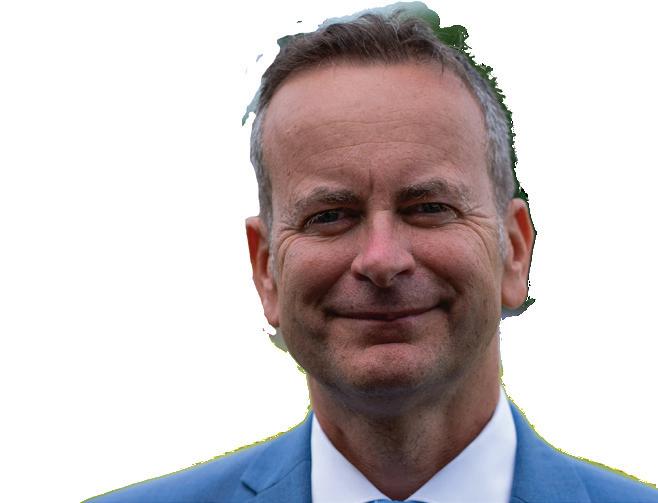
Ditch Wi-Fi? Their brains are buffering
Media reports suggesting that free Wi-Fi is set to be scrapped on trains make me question if anyone cares about business travellers

Having written a column in this esteemed mag for 12 ½ years, you’ll understand that every now and again, the print deadline approaches and I’m scratching my head, wondering what to write about. However, as predictable as the annual fares increase in rail, you can eternally rely on the dim-witted transport industry to serve up a story in the 90th minute. And so it came to pass last week when the media got hold of suggestions that free Wi-Fi is set to be scrapped on trains.
It’s not actually clear as to whether this rancid suggestion around Wi-Fi is genuinely a proposal, or, more likely, that the Department for Transport put the idea out loosely for consultation, in its quest to shore up the finances of the beleaguered rail sector. Whatever the case, even to suggest this as a concept for discussion is remarkably naïve, particularly as the media have seized on it as another headline to show the industry as out of touch, crass and commercially backward in its thinking.
What would appear to be the case is that Transport Focus commissioned one of its fairly regular surveys to sense-check customer priorities. These surveys are well intentioned, but they tend to state the blatantly obvious that, whoopy-do, customers really want trains to arrive and depart on time. And, shock horror, when presented with a list of priorities, stuff like punctuality, reliability, frequency and fares were above, brace yourself please, free Wi-Fi. Stunned by this incredibly insightful
response, it would seem the DfT, and possibly the Treasury or others in influence in rail, then used this as an opportunity to question the sanity of continuing to provide free Wi-Fi. For the industry to even countenance the suggestion of scrapping free Wi-Fi would confirm to me that we are at our lowest point since Stephenson’s Rocket in rational, customer-led thinking and savvy around market conditions. Self-awareness among some decision-makers in rail has always been an attribute in short supply, but this would cap it all. At a time when the industry should be exerting every sinew of its body to explore ways to attract existing customers back to the network and win new ones, this is the last thing it should. Thankfully, from what I gather, the
rail TOC MDs, those closest to the customer and most knowledgeable about the market, are up in arms at the suggestion, but sadly it’s been a long time since they were properly listened to.
Countenancing the abolition of free Wi-Fi would be a dagger blow in a downward trend in the way that the rail sector treats business customers. Do you remember in pre-Covid times when First Class carriages were very busy? Back in these lofty days, the catering proposition was more varied, table service was frequent and meticulous, there were decent fares offers and First Class lounges were in the ascendancy.
Like many things in life, Covid-19 was an excuse to get lazy. Many train companies phased out First Class completely, forcing those business folk who wanted space and peace and quiet to think and work, as well as a guaranteed seat, no alternative but to sit with the screaming kids, boozed-up football fans, or listening to the shrill hen-dos in Standard. Meanwhile, where First still prevails, you’re never certain the meal service is going to arrive, and the ticket checks and on-board service more generally don’t feel differentiated. First Class lounges have been cut back, along with the freebies, and some of them are unstaffed. The experience is as devoid of character and innovation as the franchise agreements between the DfT and TOCs in which their presence is specified as ‘committed obligations’.
I’m not suggesting customers should receive an apartheid-style service, but you’d generally hope that when it comes to the design and delivery of the proposition for business customers, that railway management and staff would be more sensitive to the fact that your lifetime spend as a premium customer was considerable. For this reason, when I was at British Airways back in the day, the more experienced and customer-centric cabin crew were always put in First Class where they’d spend an entire trip acting as personal guardian angels to each customer, eternally grateful to them for their high yield spend.
The service for those wishing to take a business trip has become destabilised even from a performance perspective. To add insult to injury, LNER recently undertook engineering works midweek meaning that a London-York business trip for a mate of mine took six hours. The justification in the media
18 | 2 June 2023 www.passengertransport.co.uk COMMENT
‘Free Wi-Fi is seen as a human right’
from LNER that this change in approach cleverly reflected the new demand patterns for rail travel, seemed like one of those attempts at spinning how innovative and customer-led it was being. In truth, it alienated those of us who rely on long distance rail travel to undertake our business.
The continued strike action, with no end in sight, is another blow to business customers. It’s easy to detect that the government is rather laissez-faire about the strike. There hasn’t been the opprobrium about the dispute that there was back in 1981 or 1994, the last prolonged eras of industrial action, mainly because folk are normalised to working from home while leisure customers can generally pick and choose the days they travel. But, for the poor business customer, it is awful. Furthermore, for us small business owners, it is worse. Every meeting cancelled comes at a lost opportunity cost to us. Re-scheduling weeks later when diaries make it manageable can, in the sales game, mean the moment has passed, time has moved on and opportunities disappeared. If we have no option but to still attend the meeting, we have to fund hotels either the day before or after (or both) so that we can remain able to travel. We’re also paying for our own travel, and the days of competitive fares are very much in decline.
SME business owners are, dare I say it, those who, in my view, more actively want to make the journey. We want to, and we need to generate income, and time is money. Those in employment, just like those working for organisations in the rail industry, are, when the going gets tough, able to shrug their shoulders, work from home, take a day off in lieu, delegate tasks upwards or downwards, travel during the business day (in ‘work’s time’) and not worry about the cost because they’ll just get the PA to ask Capita to fix a ticket, or they get free staff travel. But the industry doesn’t really care about us.
Back to free Wi-Fi. Can you, for one second, imagine a hotel, coffee shop, airport or any service outlet these days, reining it back and levying a charge? Of course not. Can you also imagine other sectors being as incapable of realising the strength of their core product and its potential, in the way that the rail industry seems so often to be?
Very often, on balance, I choose to make business trips face-to-face, rather than online because I know that if I can somehow find a
bargain, I can work on the train in the comfort of First Class, or indeed on some of the better rolling stock (normally the older trains), in Standard, and have a spacious, quiet area with good Wi-Fi and actually have some great thinking time and get a lot of work done both ways. There is also the prospect of a cup of tea, some nosh, good interaction with chirpy staff and waiting in a decent coffee shop or lounge before departure to catch up on my emails. It is time well spent and all whilst occasionally looking out of the window at the fantastic scenery as the train majestically traverses our lovely landscape at speed. What’s more, as I’ve oft said, the face-to-face meeting at the journey’s end (if I haven’t already had a meeting on-board the train with a colleague or client) will always be more productive than on Teams and the attendees are grateful that you’ve made the effort, rather than chosen the easy option. How often do you see the rail industry play to the strengths, in terms of their marketing, of the product that I have described above? Marketing campaigns are few and far between and where they exist, they seem to be restricted to events, such as Valentine’s Day or Easter and they’re all about the leisure customer, rather than us morons who (have I told you this already?) are keeping the economy going, whilst those on the payroll are preparing for their work from home Friday summer barbecues in the garden or enjoying their 30 days of annual leave and paid bank holidays?
I recall several years ago, LNER managing director David Horne presenting at a conference that ‘free Wi-Fi is seen as a human right’ by customers. He was spot on, which is why the very thought that it might be abolished seems sacrilege. Yes, most customers have mobile data, but many have caps on that and are grateful for the opportunity not to eat into their allocation. For business customers (and those SMEs, in particular, who pay for their own Wi-Fi and don’t rely on an employer to do so), free Wi-Fi is one of a few (not many) customer benefits that together create a package compelling enough for them to choose to make a business trip and do so by rail. Take that away and ambiguity and uncertainty replaces the hassle of cluttering their already busy and stressed mind before and during a trip, trying to work out what they will or won’t get on their journey. They need to know that everything from collecting their ticket from a machine,
parking their car, having a decent space at the station to do a Teams call en route, table seat to use the laptop, plug socket to charge the phone on-board, taxi at the other end, contingency if the train is cancelled or delay, is all guaranteed and taken care of.
Is it too much to ask for someone in officialdom in the rail industry to be presiding over a plan for business travel? You’d like to think that in the new world of Great British Railways that there will be a department that ‘owns the business customer’ and is responsible for designing an innovative, customer-centric product that exceeds their expectationsmaybe a proper office space on board so that customers can meet and work conveniently and confidentially and with Wi-Fi that has had investment and been strengthened. The business travel czar and his or her team could also be dreaming up and delivering cuttingedge, targeted marketing campaigns, as well as doing corporate deals with big employers and focusing also on the needs of us SMEs. Importantly, they’d have proper insight at their fingertips around business customers in terms of current and future trends. They’d also under no circumstances allow anyone to interpret ‘stating the obvious’ research that shows customers think a train turning up on time is more important than free Wi-Fi and try and see that as an opportunity to engineer a costsaving that will do more long-term damage than good.
Hopefully, sanity will prevail, and this preposterously idiotic idea will be immediately consigned to the bin. Even as a very regular business customer, let alone someone who travels frequently on leisure purposes, I’m insulted, that it was even the basis of a ‘testing the water, consultation exercise, at a time when I’m not exactly feeling like I’m getting value for money as a loyal customer.
ABOUT THE AUTHOR
Alex Warner has over 29 years’ experience in the transport sector, having held senior roles on a multi-modal basis across the sector. He is co-founder of recruitment business Lost Group and transport consultancy AJW Experience Group (which includes Great Scenic Journeys). He is also chair of West Midlands Grand Rail Collaboration and chair of Surrey FA.
“Even to suggest this as a concept for discussion is remarkably naïve”
www.passengertransport.co.uk 2 June 2023 | 19
COMMENT NICK RICHARDSON

The hidden cost of electric vehicles
In all the talk about how electric vehicles should replace all conventionally fuelled vehicles, little is said about how batteries are manufactured and the resources needed. We project glib targets about electrification of the road fleet on the assumption that everything needed to achieve this is available, cost-effective and environmentally acceptable, but the truth is rather different. Looking at the raw materials in more detail explains the problem.
The Times recently addressed this but I suspect that its readers who are in a position to contemplate having an electric car are probably less bothered about the consequences and rather more interested in their own requirements and the image they project. Inevitably, extracting the materials required from the environment has severe effects on communities that will never aspire to own an electric vehicle because they are trying to survive in the face of environmental destruction.
Battery power
Lithium is a core ingredient of batteries from phones to vehicles and everything else, powering the developed world. The science is incredible with lithium atoms moving around inside batteries as they are charged and discharged. It originates largely in Chile, where the extraction is to be taken under government control, with other sources in Argentina, Australia, China and the Czech Republic. The
method of extraction involves pumping brines of lithium from the ground and into ponds. Half of the lithium on the market and most of the known supply comes from brines which are subject to evaporation, a slow and landconsuming activity. It also consumes hundreds of tonnes of water for every tonne of lithium released. By 2050, keeping pace with the presumed growth in electric vehicles, lithium production will need to be between 20 and 40 times the current production rate so The Times reports; clearly this is a problem and may not be achievable. For every road vehicle, including electric buses, we welcome this new technology that keeps our streets clean and make our world a better place; unfortunately this is detrimental to the global community. While we feel good about our contribution to the environment, the outcomes are catastrophic to others. There are better methods of extraction, notably using ceramic beads which consumes a tenth of the water and a thousandth of the land required by the traditional method. In Cornwall, geothermal heat is being applied for extraction. The inevitable consequence is that unless better methods of production can be found, the price
of lithium increases. It also means that whoever controls the supply is in a strong position commercially and politically.
Another component is nickel. In Indonesia, indigenous forest-dwelling people are being replaced with nickel extraction. Similar tragedies are occurring in DR Congo in pursuit of cobalt where agricultural land has been requisitioned and flooding in Guyana has been attributed to manganese mining. All generate a familiar theme - richer parts of the world seeking resources to make life more comfortable at the expense of poor economies and communities. It appears that almost half the minerals needed to complete the world’s energy transition from fossil fuels are located on or near to indigenous lands. The British Geological Survey has identified eight areas for exploration for nickel and cobalt but it will take more than a decade to extract them on a meaningful scale.
Recycling
The consumer society generates waste on a huge scale. Electrical and electronic items are a huge culprit with sought-after components being thrown away; recycling centres have skips full of things that could be reused, if only the components could be separated more easily. Battery recycling could be a huge source of materials for new batteries. The Faraday Institute calculates that 28,000 tonnes of electric vehicle batteries will need to be recycled in the UK by 2030, rising to 235,500 tonnes in 2040. While there are processes for extracting lithium and other metals, creating a cycle of life-expired batteries and manufacturing new ones on the scale needed has yet to be achieved. However, there may be competition for the resources available between electric vehicles and the multiplicity of other applications such as smart phones.
Scoping the future
Meanwhile the hope that electric vehicles represent salvation persists; supporting this is the fallacy that they are somehow ‘green’. We can consider electricity in other waysthere is a difference between vehicles that carry their power supply around in the form of batteries (or liquid fuel for that matter) and vehicles that draw energy from a power source elsewhere. Scaling up batteries for larger vehicles such as buses illustrates the
Sourcing the ingredients of an electric vehicle’s battery defines how many can be produced, but there are also other challenges
20 | 2 June 2023 www.passengertransport.co.uk
“28,000 tonnes of electric vehicle batteries will need to be recycled in the UK by 2030”
problem in that batteries are heavy so more power is needed to move the vehicle. It seems that some car parks are in danger of collapse if they are filled up with electric cars, such is the weight problem. We could have buses that cover longer distances on one charge if we have even more batteries but it’s actually rather primitive because the bus will be bigger and heavier. Compare this with transport that is powered externally including electric trains, trams and trolleybuses. Here the energy is created elsewhere and transmitted to the vehicle. Providing that the energy is created sustainably - with large scale production rather than individual vehicles this is far more likely - then we have an environmentally acceptable result. It requires infrastructure, which is why much of it was cast aside decades ago. However, a trolleybus has a wider range than a battery bus and an electric tram or train will go on for as long as the power station keeps producing. Because it is a matter of scale, it reinforces the view that the emphasis on personal mobility (cars) should be less than that for mass transit. In answering the wrong
question, we will inevitably fail to derive global scale effective and sustainable transport. The excursion into diesel-electric hybrid territory proved that adopting new technology is not always the best course. Now we see hybrid buses being converted to diesel or electric because the hybrid batteries haven’t delivered and require complex equipment to be carried around. The loss of trolleybus networks in the UK was a tragedy because we threw away electric buses in favour of short term cost-saving and the ‘flexibility’ of diesel buses. Ironically, most bus routes changed little and environmentalism has become essential. Imagine quiet buses that could deal with large volumes of users (and hills!) all powered from a sustainable source - now an aspiration but formerly a reality. Similarly we lost tram systems because track and other infrastructure needed renewing. Asset renewal is part of life and if we applied the same thinking to trains, we wouldn’t have any railways. Trams in streets can be disruptive when renewal in required in just the same way that roadworks disrupt bus services. The need for flexible services can be
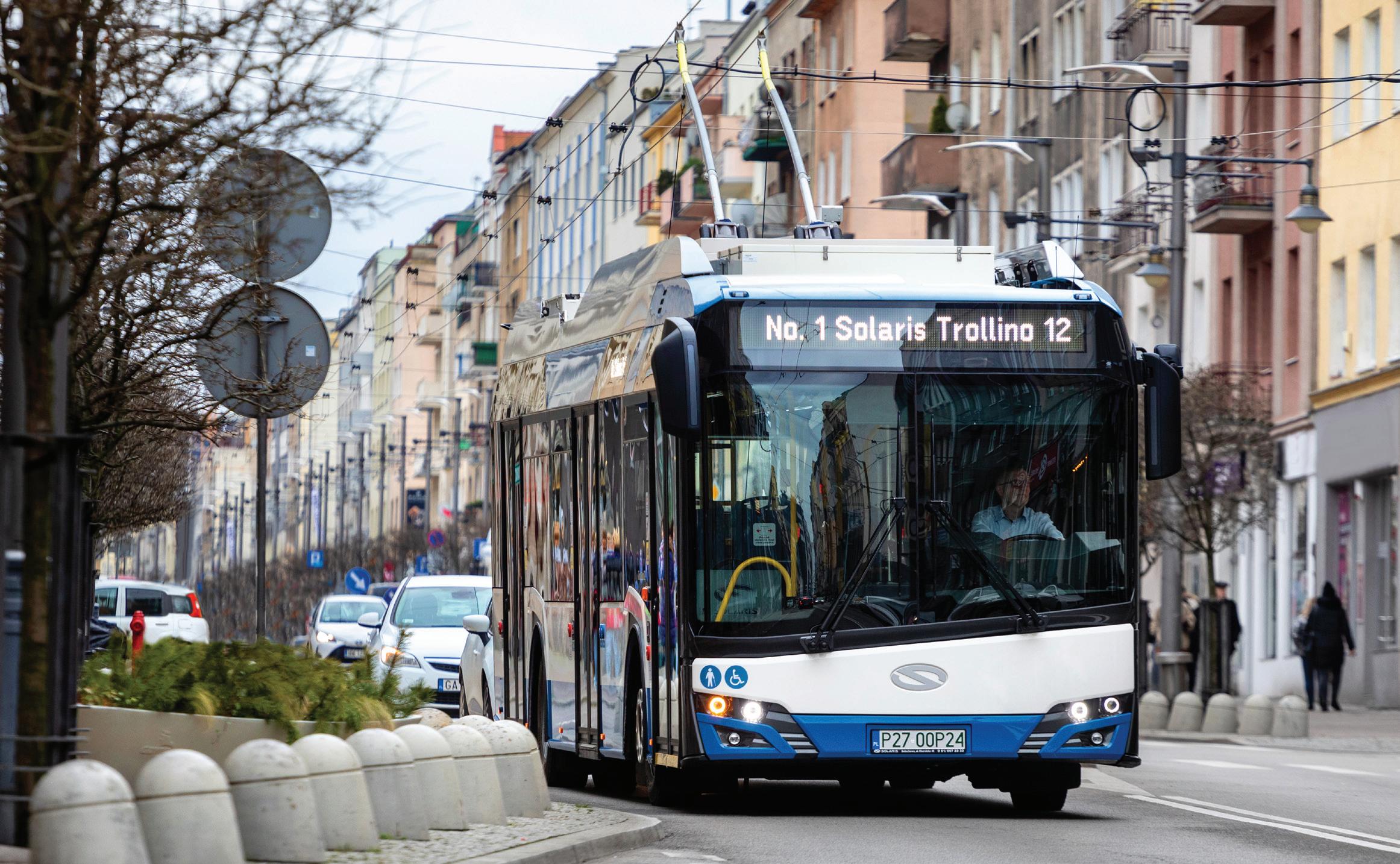
covered for now by diesel buses and all modes can work together harmoniously - today we call it integration but it used to happen naturally. Electrifying the road vehicle fleet is likely to never happen on the scale hoped for so personal transport will have to rely on something else. Electric buses have a role but maybe not be the one anticipated. Technology should be concerned with betterment i.e. progressive science rather than scrambling for scarce resources to benefit some people over others. Equity is achieved by mass transit and forms a key component of a sustainable future but we seem to have drifted away from that in pursuit of a dream that is unlikely to be fulfilled.
ABOUT THE AUTHOR

Nick Richardson is Technical Principal at transport consultancy Mott MacDonald, chair of CILT’s Bus and Coach Policy Group and a former chair of the Transport Planning Society. In addition, he has held a PCV licence for over 30 years.
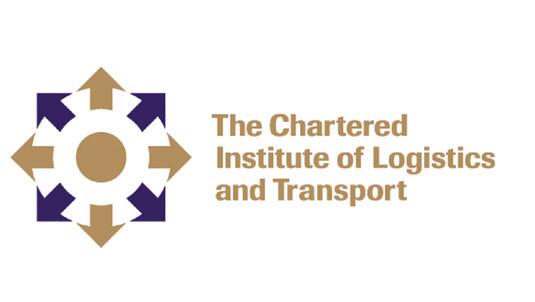
IN ASSOCIATION WITH: www.ciltuk.org.uk Tel: 01536 740100 @ciltuk
www.passengertransport.co.uk 2 June 2023 | 21
Solaris still manufactures trolleybuses. Sadly UK trolleybus systems were cast aside many years ago

20 years of collaboration on the road to Zero
After two decades of hard work to decarbonise UK road transport, there’s a great deal to be proud of
transport (five Labour and seven Conservative) and even more ministers of state (of all flavours) with lead responsibility for transport decarbonisation.
Andy Eastlake
Though I’ve become less focused on birthdays (especially as I’ve got older!) I do remember my 20th (some time in the eighties!). These occasions do provide a prompt to reflect on what’s gone before. It’s hard to believe (for me, at least) but Zemo has reached the grand old age of 20 this year. Zemo’s teenage years were in a vibrant, dynamic and ever changing transport sector and as the partnership reaches maturity, it’s a moment to take stock of the dramatic changes we’ve helped to stimulate through collaboration.
In its two decades, Zemo (formerly as LowCVP) has seen five general elections, six prime ministers, 12 secretaries of state for
We’ve seen many changes of political leadership and significant challenges, including phases of austerity, political uncertainty and almost unprecedented turbulence.
However, despite attacks from some quarters, governments since 2003 have undoubtedly, bought into the cross-party consensus on the need to tackle the causes of climate change and bring forward policy prescriptions to decarbonise road transport, one of the more difficult sectors of the economy to tackle.
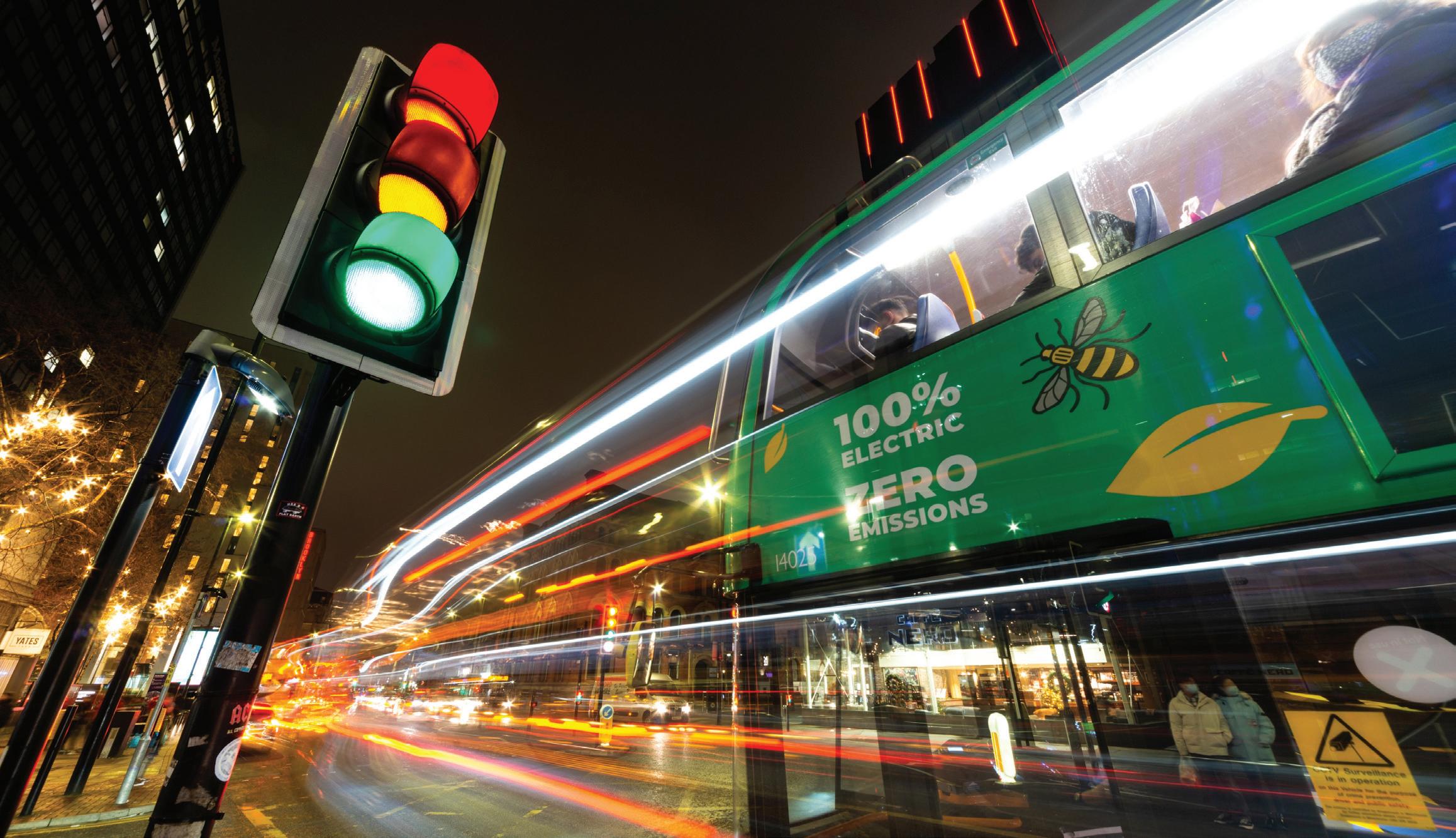
The 2008 Climate Change Act was a pivotal moment. The Act committed the UK Government by law to reducing greenhouse gas emissions to 80% of 1990 levels by 2050. The Act established the Climate Change Committee - a body that Zemo has worked closely with over the years - to monitor and report on progress towards the legal targets.
In 2019, the Climate Change Act was strengthened when the UK became the first major economy to commit to a ‘net zero’ target
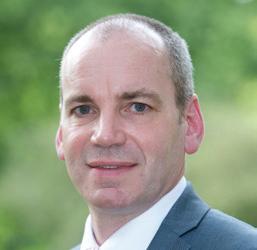
ROAD TO ZERO: CONTENTS Claire Haigh: Zemo’s work is more important than ever 26 Newport Transport: Setting the Net Zero standard for SMEs 29 Janus Architecture: A route to decarbonising depots 31
Zemo Partnership
www.passengertransport.co.uk 2 June 2023 | 23
There are around 2,000 zero emission buses in service in the UK today, representing around 5% of the UK’s total fleet
by 2050. (At the end of last year, around 140 countries had announced or were considering net zero targets, covering close to 90% of global emissions.)
Key moments in domestic transport-related climate policy have come hard and fast in recent years. In 2020, the government took the historic step of announcing the end of the sale of new petrol and diesel cars and vans by 2030 and all ICE hybrid versions by 2035. In 2021, the government followed up with the announcement that no new emitting heavy goods vehicles would be sold after 2040 (and smaller trucks by 2035). In 2022, consultations (for which the government is still to issue full responses) there were proposals to end the sale of non-zero emission buses and coaches, and powered light vehicles too.
The overall plan is that sales of all new emitting road vehicles will end at least a decade before the 2050 deadline set by the Climate Change Act and stock turnover should mean that there are very few ICE vehicles left to produce emissions from the tailpipe on the UK’s roads by 2050 (and we’ll make sure that any that remain are powered by low or zero carbon fuels, of course).
The 2021 Transport Decarbonisation Plan set out the government’s decarbonisation ambitions and commitments for all transport
sectors. It included several policy prescriptions that Zemo and partner organisations had proposed or for which collaborative activities convened by the Partnership had laid the foundations.
Reflecting on Zemo’s role in the UK’s progress along the ‘road to zero’ over the last 20 years, there are several highlights which relate directly to the passenger transport sector.
Early in the chronological list of Zemo’s ‘Top 20’ achievements (see below) was the Partnership’s role in establishing key, independent structures which are now working effectively to ease the way to net zero transport. Examples of this are the UK’s Centre of Excellence for Low Carbon and Fuel Cell Technologies (CENEX) which is a not-for-profit organisation, focusing very effectively on breaking down barriers to transport decarbonisation. Zemo (as LowCVP) also provided input into the Low Carbon Innovation Strategy which paved the way for future Innovation UK funding. Later work led to the creation of the Advanced Propulsion Centre in 2013 which now leads initiatives to accelerate the industrialisation of green technologies for vehicles.
In the early days, the partnership played a key role in ensuring that biofuels brought to market are renewable and environmentally
20 YEARS OF PARTNERSHIP:
Highlights of Zemo’s work in accelerating road transport’s transition to net zero
beneficial, with ground-breaking work on sustainability standards, underpinning regulations for the UK’s Renewable Transport Fuel Obligation (RTFO) which has ratcheted up the amount of renewable fuel added to all retail petrol and diesel. (Then) LowCVP input was central to the seminal Gallagher Review which covered the indirect effects of biofuels and which was a key influence on later policy.
More recently, Zemo has followed up earlier work on renewable fuels, introducing the Renewable Fuels Assurance Scheme which provides independent advice on fuels’ greenhouse gas emission savings and raw material provenance, helping to improve operator confidence and trust in the sustainability performance of fuels like HVO and biomethane.
A big impact on buses
It has been Zemo’s work in the bus sector that has had the most direct impact on mass passenger transport. (The partnership’s Bus Working Group actually met for the first time in December 2002, before the official launch of LowCVP in 2003 - such was the energy and appetite for collaboration in the sector!)
From around 2009, the partnership has laid the foundations for the UK’s success in decarbonising buses, playing a central
1 2
Helping buyers make the ‘greener’ choice (2005)
LowCVP* launches the colour-coded New Car Fuel Economy Label. (Version for second-hand cars introduced in 2010).
Laying foundations for future success (2005-onwards)
LowCVP and partners establish UK’s Centre of Excellence for Low Carbon and Fuel Cell Technologies (CENEX). Input into Low Carbon Innovation Strategy, paves way for Innovation UK funding. Later work with government and partners leads to creation of Advanced Propulsion Centre (2013), to accelerate industrialisation of green technologies for vehicles.
Ensuring that biofuels are ‘green’ (2008)
LowCVP work on sustainability standards underpins the Renewable Transport Fuel Obligation (RTFO).
Deepening government-stakeholder collaboration (2009-10)
Partnership transitions to become jointly-funded by members and government.
3 4 5
Leading on clean buses (2009-onwards)
LowCVP/Zemo supports establishment of UK Government grant schemes including the Green Bus Funds, LEB, ULEB and ZEBRA schemes, underpinned by industry-supported certification and accreditation processes. Supports revision of Bus Service Operators Grant to align with government environment policy. UK leads Europe on low emission bus uptake.
Focusing on the full life-cycle (2010-onwards)
LowCVP leads ‘Beyond the Tailpipe’ drive for full LCA (life-cycle assessment) of greenhouse gas emissions from transport.
Driving the market for electric vans (2011)
Research managed by LowCVP leads to launch of Plugged-In Vans grant programme.
Leading on truck decarbonisation (2011-12)
Working with key stakeholders, LowCVP publishes major report on barriers to the adoption of low carbon HGVs. Work leads to £9.5m Low Carbon Truck Programme.
6 7 8 9
Cutting ‘greenwash’ (2012-13)
LowCVP with SMMT and ISBA issue influential ‘Best practice principles for environmental claims in marketing’.
24 | 2 June 2023 www.passengertransport.co.uk ROAD TO ZERO ZEMO PARTNERSHIP
ZEMO’S ‘TOP 20’
role in the ‘bus innovation life-cycle’. The partnership, with its members, has been central in establishing the parameters for all the key UK Government grant schemes to incentivise low and zero emission bus uptake and has underpinned these with industrysupported certification and accreditation processes. Our terminology has evolved in parallel with technology advances; from the original Green Bus Funds to low carbon (LCEB), ultra-low emission (ULEB) and now zero emission bus (ZEB and ZEBRA) schemes, we have constantly raised the barand the market has responded.
The partnership has also worked to ensure that the government spends taxpayers money wisely and that its policies don’t undermine each other. Zemo, for example, supported the update to the Bus Service Operators Grant (BSOG) to align with the government’s overall environment policies. The partnership also worked with government to develop an accreditation scheme for repowering buses to zero emissions (ZEVRAS) to enable operators to claim the significant BSOG ZEB uplift.
With support through the partnership’s very active Bus Working Group, we have carried the word to bus operators with ongoing series of regional, low and zero emission bus workshops and published several (regularly updated) ‘low
and zero emission bus guides to help spread best practice and learning across the industry.
The UK’s policy on bus decarbonisation is widely recognised as having been a real success. The UK is now outperforming Europe on zero emission bus uptake. According to Zemo analysis, an average of 513 new zero emission buses (ZEBs) have started operations in the UK over the last three years and there were a total of 639 in 2022. For the last two completed years, ZEB registrations accounted for close to 50% of all buses registered in the UK and the prospects look good for a significant majority of bus uptake in 2023 to be zero (tailpipe) emission, with battery electric vehicles continuing to be the leading technology used. There are around 2,000 ZEBs in service in the UK today, representing around 5% of the UK’s total fleet. By 2025/26, Zemo expects this figure to be 10%.
A recent survey by the Dutch consultancy Chatrou CME Solutions has the UK at the top of a 31-nation league table for uptake of battery electric buses.
Zemo is now beginning to focus on
Encouraging leadership and innovation (2013-18)
Low Carbon Champions Awards celebrate achievement in road transport decarbonisation.
Groundbreaking research (2014)
LowCVP publishes ‘Investing in the Low Carbon Journey’- lessons from the first decade of UK policy on the road to 2050. Motor industry shows we can have both ‘green’ and growth.
Laying foundations for renewable fuels uptake (2015)
LowCVP-convened Transport Energy Taskforce reviews future targets for GHG emissions and renewable fuels. Recommendations adopted by government through the RTFO
Cutting emissions from current vehicles (2016)
LowCVP establishes accreditation scheme for retrofits (CVRAS).
Joining the climate and air quality agendas (2016-17)
Partnership leads ‘Lower Carbon, Cleaner Air’ initiative bringing climate and air quality campaigns closer together.
Paving the way for green truck trials (2018-onwards)
Partnership work on emissions testing provides basis for Government incentive programmes, leads to ZERF and Low Emission Freight Trials. Right vehicle for the right use (2018-onwards)
Partnership work with industry on PLV (powered light vehicles) is recognised in the 2021 Transport Decarbonisation Plan.
Increasing trust in renewable fuels (2021)
Zemo’s new Renewable Fuels Assurance Scheme provides independent advice on fuels’ GHG emission savings and raw material provenance.
decarbonising the coach and minibus sectors, seeking to emulate the formula that has proved successful so far for buses.
Also amongst Zemo’s ‘Top 20’ is the partnership’s work on retrofit accreditation which has enabled operators of existing vehicles to comply with Clean Air Zone standards. The Clean Vehicle Retrofit Accreditation Scheme (CVRAS) addresses the air pollution emissions from buses and coaches as well as heavy goods vehicles, mini-buses, taxis and vans.
So, as we reflect on 20 years of hard, challenging work to decarbonise the UK’s road transport, there’s a great deal to be proud of - in particular for members of our bus community.
I do hope some readers will be able to be with us at City Hall on June 15 at our ‘Zemo20:Zero’ anniversary conference. There’s certainly been much progress, especially in the drive to decarbonise buses, but a great deal remains to be done together, so do ‘stay on the bus’ with us for the rest of the journey to zero emissions mobility.
ABOUT THE AUTHOR
Andy Eastlake was appointed as Chief Executive of Zemo Partnership in 2021 having been Managing Director (of LowCVP) since 2012
Bringing transport and energy together (2019-22)
Zemo convenes highly influential EVET (EV Energy Taskforce); ground-breaking collaboration to maximise benefits from the introduction of EVs for the UK’s energy system. Cutting carbon through renewable fuels (2021)
Zemo’s work over many years leads to successful introduction of E10 petrol in UK. Influencing the agenda (2004-2023)
Zemo/LowCVP Annual Conferences and Parliamentary events are leading fixtures in the transport decarbonisation calendar.
* Zemo Partnership re-branded and changed its name in 2021 from Low Carbon Vehicle Partnership (LowCVP).
10 11 12 13 14 15 16 17 18 19 20
www.passengertransport.co.uk 2 June 2023 | 25 FIND OUT MORE zemo.org.uk
“The UK is now outperforming Europe on zero emission bus uptake”
Zemo’s work is more important than ever
Parliamentarians, senior civil servants, local leaders and industry say the priority now for net zero must be delivery. Zemo can help
Earlier this year the International Panel on Climate Change issued its final warning for a critical decade. Global greenhouse emissions must be reduced by 43% by 2030, and the IPCC’s final synthesis report laid bare just how far off track the world is. Massive effort is now needed if we are to avoid the catastrophic consequences of runaway climate change.
The UK has a strong track record on net zero having been the first advanced economy in the world to commit to net zero emissions by 2050. However, it risks being outpaced. Hugely consequential decisions are being made by the US, EU and China, which pose challenges for its global competitiveness. It is vital that the UK moves fast to decarbonise at the pace and scale required, and to seize the opportunities presented by the net zero transition.
Transport is the fastest growing source of
global GHG and the biggest polluting sector in the UK economy. At 90% of all domestic transport emissions in the UK, road transport is a major chunk of the problem. Since its inception in 2003 Zemo Partnership has played a key role in this critical sector, uniquely bringing together the forces of the automotive sector with the forces of government to achieve the shared ambition to decarbonise road transport.
To coincide with Zemo’s 20th anniversary, I was asked to undertake an independent review of the partnership. I consulted with 86 parliamentarians, senior civil servants, local leaders and industry on priorities for net zero transport and how Zemo can most effectively support the agenda through this critical next phase.
The priority now is delivery
The overwhelming feedback was that the priority now for net zero must be delivery. It was felt that whilst the UK has some good strategies in place, it is vital to get the right policies in place to enable the investment that will deliver the transition to zero carbon technologies, and reliable funding to enable the supply chain transition. Crucially, there are significant implementation challenges to be tackled.
EVs have moved into their delivery phase but supply chain issues are affecting availability and lack of charging infrastructure is a serious barrier. Moreover, EVs are too expensive and out of reach for many consumers, particularly those without off-street parking. Equity issues must be addressed, or the risk is that net zero will come to be seen as a middle-class project. A quarter of households and half of workless households have no access to a car.
The integration of the transport and energy sectors will be critical. This will require a whole system approach and major reinforcements to the grid. It will involve the synchronisation of activities between National Grid, DSOs, EV charging infrastructure, EV manufacturers, policy-makers, financial services, funding bodies, local authorities, and anything else that is related to street works and lamppost installations.

Bringing the right people together will be vital for delivering the EV transition. The Electric Vehicle Energy Taskforce was seen to be an excellent initiative and should be
 The technology roadmap for zero emission local bus was a significant step forward
The technology roadmap for zero emission local bus was a significant step forward
26 | 2 June 2023 www.passengertransport.co.uk ROAD TO ZERO ZEMO PARTNERSHIP
Claire Haigh Zemo Partnership
built on. Zemo’s convening power was cited as a major benefit. Zemo is also in a unique position because sitting between government and industry, dual funded, it is unbiased by any particular entity or interest and performs the role of honest broker.
The technology roadmap for zero emission local bus was a significant step forward. What is now needed is a costed roadmap for making the transition. Much greater policy certainty is needed for bus manufacturing and the supply chain. Zemo is seen to have a crucial role to play in providing quality impartial analysis on carbon and cost aspects of electric bus roll-out, how to mitigate risks, and how to overcome constraints arising from installing the charging infrastructure.
The structure of the freight industry presents challenges for net zero, being wholly private and including many SMEs. Lack of clear policy direction on what the future technology should be is also holding up the transition. However, emissions need to be reduced now. Zemo’s work on low carbon fuels has been vitally important. As one participant observed: “The only time we saw a big step forward was when the RTFO [Renewable Transport Fuel Obligation]was introduced in 2016-18 and then when we brought in E10”. There are divergent views. Some argue that we should move as quickly as possible to electrify trucks and avoid using low carbon fuels, because that would risk locking in fossil fuels. Others argue that electrification won’t work for long distance trucks, and that low carbon fuels will be an essential part of the transition. Zemo is seen to be well-positioned to provide a balanced view and effectively do for the HGV sector what it has successfully done for the bus sector.
A holistic approach is needed
A key theme was the need to consider wider environmental aspects. It is not sufficient to focus on carbon emissions in isolation, we also need to consider air pollution from NOx emissions, non-exhaust emissions from tyres and the environmental impact of batteries. It is also felt that there is too much focus on tailpipe emissions rather consideration of the whole life-cycle, and too little focus on the carbon in our roads and transport infrastructure. Decarbonisation of transport will require changes to the wider economy and should be
aligned with future investment plans. Many observed that the current tax structure isn’t fit for purpose for a zero emission world. We need an honest conversation about road pricing. There needs to be an agreement cross-party to look at a new way of paying for road use that replaces lost fuel duty and incentivises more efficient use of our roads.
Many respondents highlighted the need to reduce vehicle miles. We need to deliver modal switch for both passengers and freight. This could be achieved through greater support for walking and cycling, investment in zero carbon bus and train services, and reducing the need to travel. For deliveries we could support more micro-hubs to support the reduction in emissions locally through greater use of cargo-bikes.
There are significant divergences in policy on net zero between the UK Government and the devolved administrations. One of the notable differences is the level of ambition in terms of reducing vehicle mileage and demand management. Closer engagement and co-operation on the net zero agenda is needed. It is felt that Zemo, with its wide membership base of businesses operating across the UK, could be a useful convenor of increased collaborative working.
In this critical delivery phase, it was felt that focus must turn to local decision-makers who will make many of the key transport infrastructure and investment decisions. Often more progress on net zero can be made in the short term at the regional and local level as it is easier to break down the silos of government and develop integrated net zero strategies for housing, transport, employment and skills.
Seizing the opportunities
A key question playing out right now is, who will win the new green industries? The key conclusion of Chris Skidmore’s independent review was that net zero is the growth opportunity of the 21st century. The UK has historically been a world leader in this space but is currently distracted by domestic politics. We are moving into election territory
which presents both risks and opportunities. Labour has put net zero as central to its election pitch and has committed £28bn for a green industrial policy.
It was felt by many participants that the UK needs an ambitious industrial strategy, to act as catalyst for new technologies and innovation, shorten supply chains and bring production to the UK. One of the biggest problems cited was the lack of government direction and focus. Rather than setting the overall direction the current stance is to be agnostic on future technologies. Manufacturers are not clear on the direction so are investing abroad.
The green economy is the fastest growing part of the UK economy. There is seen to be a huge opportunity for business in building the case for innovation and investment in the UK. How do we align net zero with business efficiency, modernisation, and green growth?
As a respected, authoritative and trusted ‘honest broker’, Zemo could have a central role to play. As one participant put it: “If ever there was a need for Zemo it’s now!”
As we move forward in this critical delivery phase it was widely agreed that what is missing is a credible and detailed delivery roadmap. Zemo is seen to be uniquely well-placed to develop such a roadmap. The fact that government already has a pathway is seen to be very positive. The opportunity is for Zemo to provide a ‘deep-dive’, evidence-based roadmap, with cross-sectoral input, to provide a catalyst for the necessary action and policy changes.
There are doubtless opportunities for UK PLC, and if that helps to galvanise the right decisions then that’s all to the good. However, above all emissions must come down. The 1.5 degrees limit is still just achievable, but it will take a quantum leap in climate action.
ABOUT THE AUTHOR
Claire Haigh is vice-chair of Zemo Partnership. She is also the founder and CEO of Greener Vision, a not-for-profit organisation dedicated to the switch to a greener future.
“The opportunity is for Zemo to provide a ‘deep-dive’, evidence-based roadmap, with cross-sectoral input, to provide a catalyst for the necessary action”
www.passengertransport.co.uk 2 June 2023 | 27
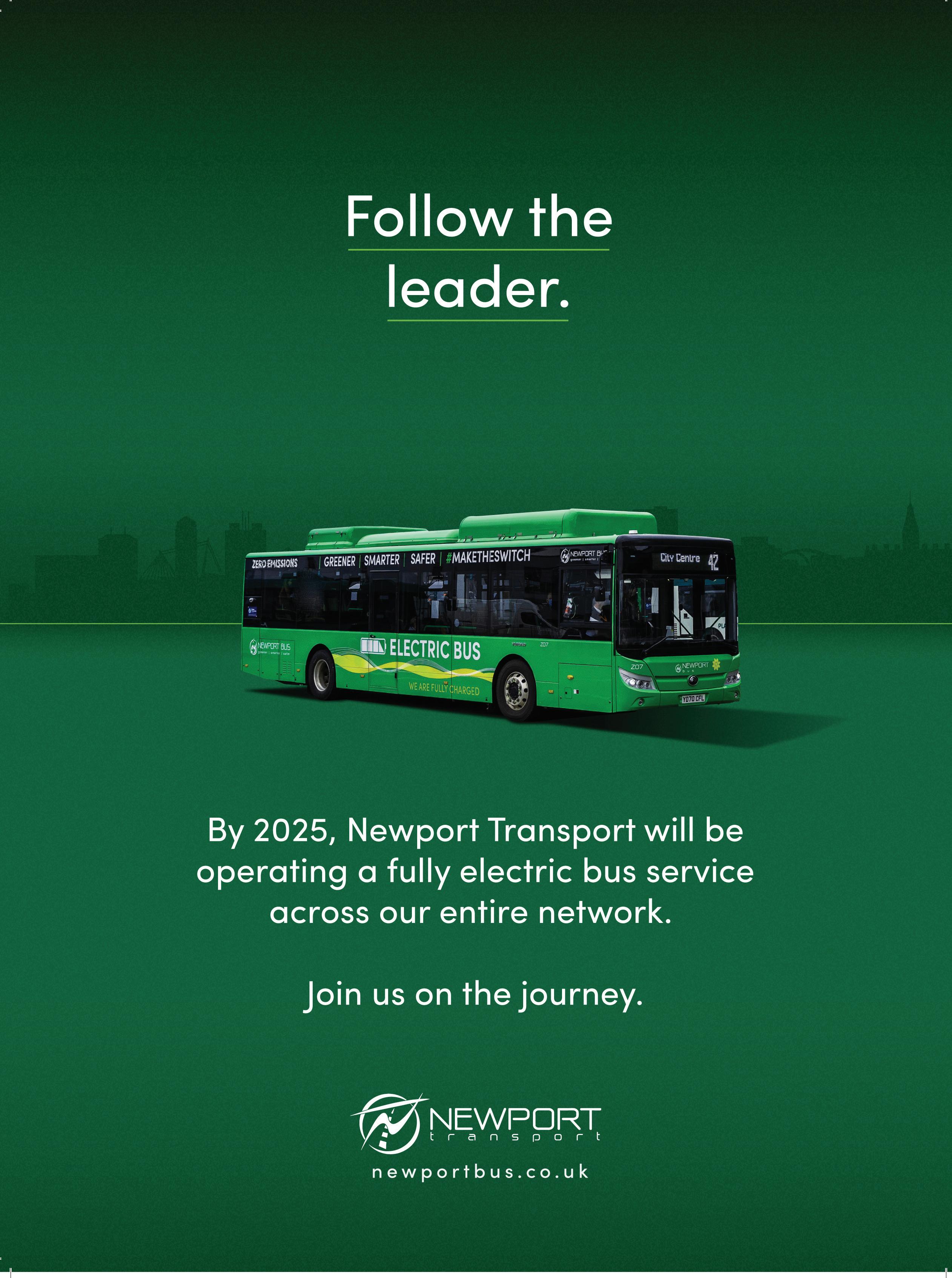
the art hospital en route.
Over the past two years, our EV fleet has more than tripled in size, growing from the original 14 buses to a total of 44. Since May 2021 alone, this expansion has resulted in a remarkable CO2 reduction of 1,280 tonnes, equivalent to the environmental impact of 128,037 trees. As we continue to increase our EV fleet to reach 57% operating capacity, we anticipate saving 2,560 tonnes of CO2 annually, accompanied by a 33% reduction in operating costs.
Fast-forward to now, and we’re approaching our goal of becoming a fully electric bus service by 2025. Currently, we are more than halfway there, achieving substantial CO2 savings and operating cost reductions through our electric vehicles alone.

Our success can be attributed to a few key elements; dedicated partnerships with stakeholders and technology leaders who have played a vital role in finding funding solutions and effective strategies, generous grants from the Department for Transport and local and national government in Wales, and the buy-in of our workforce. With this support, we are now operating 44 electric single-deck buses on our network, with further expansion planned for 2023.
Setting the Net Zero standard for SMEs

The passenger transport sector can operate at Net Zero, regardless of the size of the operator. Newport Transport is showing the way
Scott Pearson
Newport Transport
At Newport Transport, we want to show what’s possible despite being a medium sized municipal operator and I’m keen to help others do the same.
From horse-drawn carriages in 1901 to a fully electric bus service across our entire network by 2025. We continue to move forward.
Yes, funding is tight. But we must make these kinds of changes now, for our planet and the future. We must start now.
In the words of Sir David Attenborough, this
starts and ends with us.
In 2020, amidst the global pandemic, we introduced our first electric vehicles (EVs) into service. We focused on linking two urban areas, Newport and Cwmbran, passing through the historically significant area of Caerleon, which has a history of poor air quality, whilst also serving a brand-new state of
The establishment of our Coach Division - including four Yutong eCoaches marks a ground-breaking milestone for Wales. These coaches are the first of their kind in our home nation and mark a significant step forward in our green ambition and commitment to sustainable transportation. With 25 vehicles available across the division for various transportation needs, including day trips, school trips, sports clubs, and airport transfers; we are offering more sustainable shared transport options than ever before, enabling our community to choose eco-friendly travel options and with that, the opportunity to reduce congestion and improve air quality in Newport.
This new venture for us has brought another collaboration along - this time with Zeelo, a commuting solutions organisation. We’re now able to offer corporate coach hire services for employee transportation, home-to-school services, and other group travel arrangements, meaning more money into the business and - importantly - more green jobs for our local community.
www.passengertransport.co.uk 2 June 2023 | 29 NEWPORT TRANSPORT ROAD TO ZERO
Newport Transport’s goal is to become a fully electric bus service by 2025
“We must make these kinds of changes now, for our planet and the future”
Our experience is a tangible example for others in the industry, and we can and will bring others along on the journey to Net Zero. The grants we’ve accessed are available for others - we’re ready and willing to share our experiences and best practice.
Throughout our journey, our partnerships with Zenobe and Pelican Yutong have been instrumental in driving significant progress.
Steven Meersman, co-founder and director of Zenobe has expressed his enthusiasm for our fleet’s electrification, emphasising its significance in Wales’ electrification efforts.
Chris Murrell, group aftersales manager at Pelican Engineering Yutong UK, has highlighted the broader impact of electric buses, emphasising that each electric bus on the road contributes to environmental sustainability by reducing engine production and maintenance, resulting in significant oil savings.
Opportunities for partnerships are ever expanding - our collaboration has contributed to support significant growth globally, which is ever-increasing.
While it may seem daunting, it is a feasible and rewarding endeavour, resulting in ongoing business savings and a more sustainable operation.
What is truly driving us forward, however, is the fact that this expansion and
commitment to sustainability goes far beyond our day-to-day bus services. This is about ensuring our whole business operates sustainably, and we are protecting our environment - so that’s exactly what we are doing. We owe it to our future generations.
We’re working hard to foster an environmentally responsible culture, implementing various initiatives within our depot and in the wider community to reduce carbon emissions.
Installing a digital heating management system has resulted in significant CO2 savings, while the transition to LED lighting reduces electricity consumption and lowers costs.
To enhance our sustainability efforts, we have secured financial support to increase our solar capacity, aiming to meet 30% of our EV power requirements through renewable energy. Additionally, we will repurpose old bus batteries for battery storage solutions, contributing to a circular economy and minimising waste.
Through our partnership with Zenobe,
we have upgraded our electric infrastructure, ensuring our depot can support 100 electric buses and accommodate future growth. By investing in the necessary infrastructure, we demonstrate our commitment to sustainable transportation and the adoption of electric vehicles.
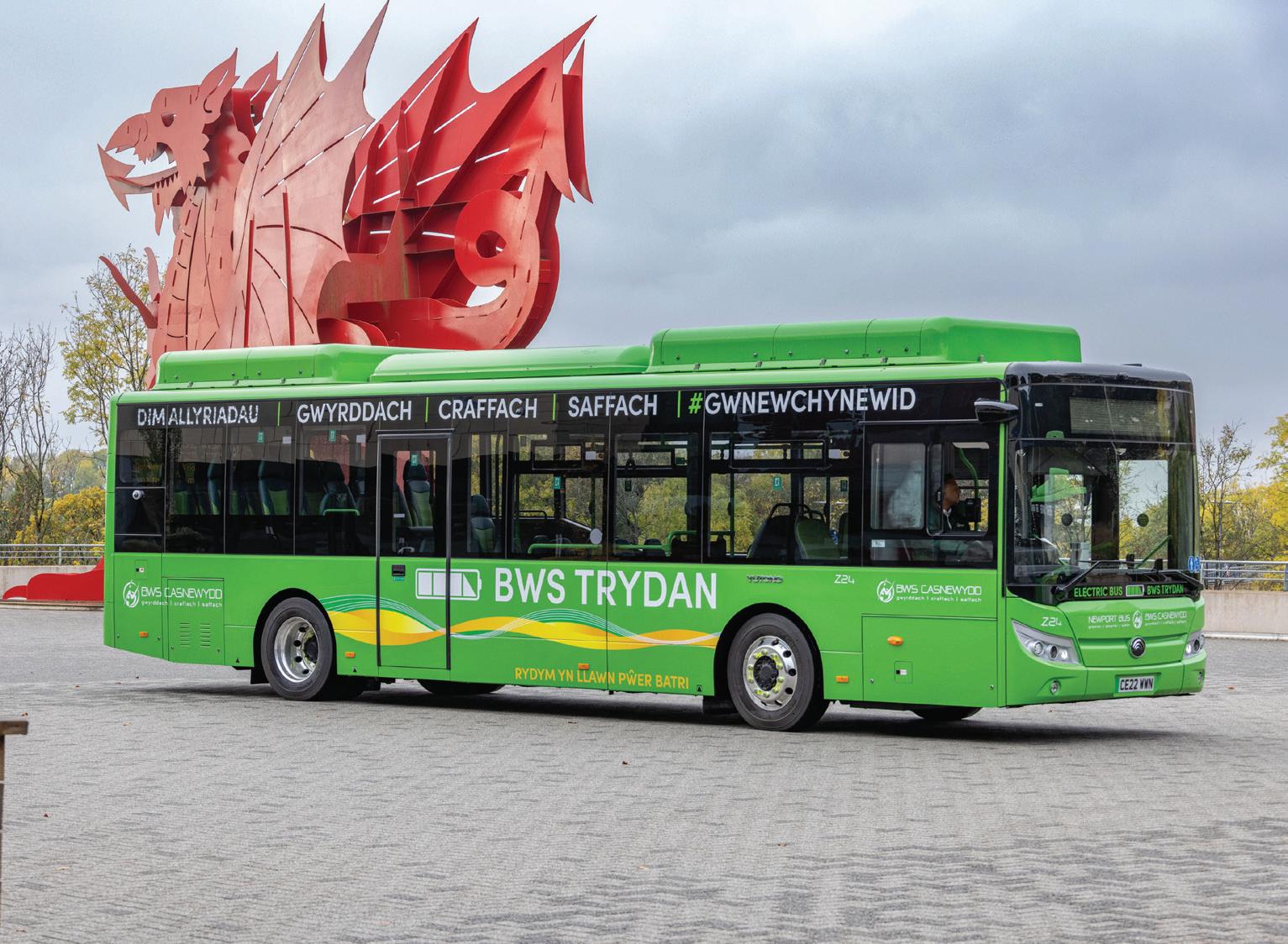
We prioritise the use of renewable energy generated by our depot to charge our EV fleet, reducing pressure on the grid and minimising our impact on the city’s infrastructure. Furthermore, we have constructed acoustic fencing using recycled plastic materials, reducing noise pollution for nearby residents and creating a more environmentally friendly environment.
In our commitment to educating and inspiring future generations, we engage with students - from primary age through to university - via presentations, workshops, and discussions. By highlighting the importance of environmental issues and showcasing green career opportunities, such as renewable energy engineers and sustainable transport planners, we ignite their interest and passion for a greener future.
We are leading the way in achieving Net Zero, and though I know I am biased, I believe we’re a shining example for providers across the transport industry.
Through our comprehensive initiatives, we are driving significant progress towards a sustainable and environmentally responsible future. We’re prioritising energy-efficient technologies, harnessing renewable energy, repurposing resources, and engaging with the community, and above all, we demonstrate leadership and inspire others to adopt similar measures - which is having an impact globally.
With our visionary approach and unwavering dedication, we are where we want to be - at the forefront of creating a greener and more sustainable future for our communities. Get on board. Be part of this journey with us.
ABOUT THE AUTHOR
Scott Pearson has been Managing Director of Newport Transport since December 2010.
30 | 2 June 2023 Brought to you by Passenger Transport ROAD TO ZERO NEWPORT TRANSPORT
Over the past two years, Newport Transport’s EV fleet has more than tripled in size, growing from the original 14 buses to a total of 44
TALK TO US www.newportbus.co.uk/get-in-touch
“I believe we’re a shining example for providers across the transport industry”
A route to decarbonising depots
Janus Architecture has found itself at the forefront of efforts to decarbonise passenger transport
As an architectural practice with over two decades specialising in bus depots, Janus Architecture has now found itself at the forefront of the efforts to decarbonise passenger transport and introduce “cleaner bus” integration across the UK. Working with several bus operators over more than 20 years we have delivered numerous depot facilities both “new build” and refurbishments projects on existing sites. This has given us the unique and specialist knowledge base as an architectural practice in which to assist in the integration of both electric and hydrogen zero emission vehicles. In an era of rapid urbanisation and growing environmental concerns, the need for sustainable transportation solutions has become more critical than ever. Among the various modes of public transport, buses stand out as a significant contributor to carbon emissions and air pollution. However, a paradigm shift is underway as cities around the world are embracing electrification and other green alternatives to power their bus fleets. Electrifying public buses in either the full electric or hydrogen electric form is a vital step toward achieving global climate goals. The transportation sector is a significant
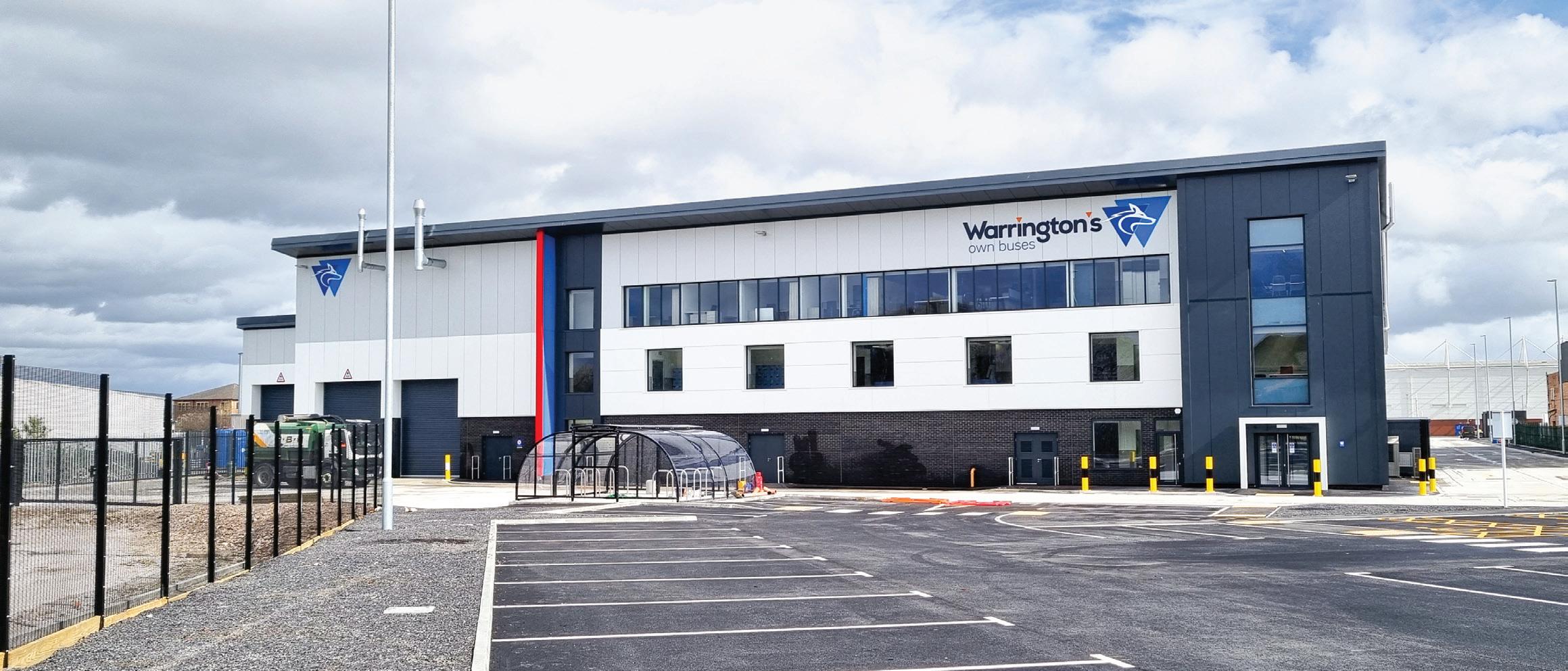
contributor to greenhouse gas emissions, and transitioning to electric drive buses can significantly reduce carbon footprints. With each electric or hydrogen bus replacing a conventional diesel-powered vehicle, the overall emissions associated with public transport can be dramatically curtailed, making significant strides towards a greener future.
Two of our earliest projects relating to “decarbonising passenger transport” were the first purpose-built hydrogen bus maintenance facility at Lea Interchange, Stratford - in 2012. This was followed by the integration of “first-generation” electric buses in York, 2015. Our journey has continued onwards with an ever-increasing portfolio of projects that integrate either full electric or hydrogen electric buses into depots.
Significant challenges
The decarbonisation of depots with either hydrogen electric or electric buses can present significant challenges to bus operators, especially within existing facilities.
One of the primary concerns of operators introducing electric buses is the loss of overall parking space for the fleet. Our experience to date is primarily with “plug in” electric buses. The integration of these in a depot normally involves new “island zones” for chargers which diminish overall parking space and capacity.
The introduction of necessary high voltage equipment such as RMU switches, transformers, and low voltage control panels, also takes precious space and needs to be considered from the outset.
Over the years we have introduced innovative solutions with our clients such as overhead gantries, with drop down charging reels at First Bus’s Leicester depot. Also, at Leicester where a depot yard was relatively new we avoided unsightly trenching digs through the introduction of above ground containment of cables, with new infrastructure simply bolted to existing slabs.
We utilised this principle for charging 120 electric buses at the existing depot at
www.passengertransport.co.uk 2 June 2023 | 31 JANUS ARCHITECTURE ROAD TO ZERO
Warrington bus depot is the new home of Warrington’s Own Buses and has been designed for 120 electric buses all designed with plug-in DC chargers
“The decarbonisation of depots can present significant challenges to bus operators, especially within existing facilities”
Caledonia in Glasgow ahead of the COP26 summit. Future phases are to be planned and will see the site become able to accommodate and charge up to 400 electric buses which will see First Bus’s Caledonia Depot become the UK’s largest electric facility. Even our latest new build depots at Warrington and Perry Barr have been designed for future electrification in mind. Cable containment, charger zones and other spatial requirements were considered. Warrington bus depot is the new home of Warrington’s Own Buses and has been designed for 120 electric buses all designed with plug-in DC chargers. With hydrogen electric buses the complexity of challenges is no less - but just different. With the exception of the earlier first-generation buses there is no need to plug the buses in for charging. This results in a parking capacity similar to a diesel-powered fleet. If the buses are parked externally the only limitation would be an external purge or degas zone which can be located with minimal impact. However, the maintenance and fuelling functions present numerous challenges. Our first experience of a dedicated facility was at Lea Interchange, Temple Mills Lane, Stratford. This was the UK’s first purpose-built Hydrogen Bus Combined Fuelling and Maintenance Facility and was completed prior to the 2012 London Olympics. It was preceded by a trial Fuel Cell Bus Vehicle Maintenance Facility at Hackney in 2003, the CUTE Project (Clean Urban Transport for Europe). The trial was successful and allowed comparisons between the fuel cell bus and diesel buses. Project partners included London Buses, FirstGroup, Daimler Chrysler and BOC.
Transport for London and FirstGroup re-engaged Janus to act as their advisors on the new Hydrogen Fuel Cell Bus Maintenance Facility at Lea Interchange. The project included sustainable features such as ground source heat pumps and specific areas of knowledge such as:
Integration of specialist fuelling requirements and features for the project partners (Air Products).
Higher level security requirements for Liquid Hydrogen Storage.
Safety requirements and HSE involvement due to presence of hydrogen.
Project specific design requirements - e.g., intrinsically safe electrical requirements, emergency, and high-pressure venting systems.
The project was delivered on programme and within budget. Project partners included Transport for London, FirstGroup, and Air Products.
More recently we were involved with a “maintenance only” facility in Walsall for National Express West Midlands. They took possession of their facility in December 2021 and currently operate 20 first generation hydrogen electric buses.
The new facility incorporates “intrinsically safe” maintenance bays located within the depot workshop. The internal bays can accommodate two buses in a tandem arrangement and includes lighting, power, compressed air services. The enclosure also includes full hydrogen leak detection linked to roof mounted extracting fans.
To protect the fuel cell technology of the bus in low temperatures, this first generation of hydrogen bus required the installation of external retractable electrical leads for a “plug-in” capability.
We have successfully delivered hydrogen fuel cell vehicle maintenance and fuelling facilities. We have experienced a steep learning curve on our hydrogen projects and together with our design partners understand that a clear understanding of HSE and DSEAR requirements is essential to success. The intricacies and knowledge of blasts zones, intrinsically safe equipment, detection, and venting equipment are also a key to success. Hydrogen bus integration is an emerging technology in the UK market, and our team are currently involved in the early design stages on projects for national bus operators and regional governmental organisations.
Summary
At Janus we have the same approach to any project whether it be for a full electric or hydrogen bus integration.
Our skill base in bus depots allows us to prepare designs and optimal bus parking
layouts for each individual site. This can provide a bus operator with the opportunity to realise minimal reduction in fleet capacity or for strategic assessment when route bidding across several sites for example.
As with any infrastructure or construction project there are always statutory hurdles to overcome. Our architectural experience in dealing with planning and building control permissions is vital to achieve these decarbonising passenger transport projects.
Obviously challenges are site specific, but we are finding that planning permission for example is now required for the simplest electrification project and can generate the need for extensive third-party reports such as acoustics and ecology requirements.
In our all commissions we focus on the same key principles:
Identify each site’s stabling capacity and current fleet profile and mix of buses.
Carry out a site visit/walk around study for each depot to understand current parking regime, manoeuvre and spacing of buses. Attend a briefing meeting with depot staff to fully understand operations-run/in-run/out schedules (weekday and weekend).
Provide accurate parking plans with vehicle manoeuvres validated by Auto Track software. Strive to provide the most economical solution to achieve the brief. Awareness of bus operator’s limited budgets.
As urban populations continue to grow, the imperative for sustainable public transport solutions becomes increasingly urgent. Electrification stands at the forefront of this revolution, offering an array of environmental, societal, and economic advantages. By embracing electric buses and other green power alternatives, cities can significantly reduce emissions, mitigate climate change, improve air quality, and promote technological innovation.
At Janus we understand that developing a close relationship with our client is paramount to the success of any project. We have a proven track record within the bus industry and have a unique specialisation in transport projects.
The path to a sustainable future requires bold action and collaborative efforts from governments, transportation authorities, and the private sector. Through the electrification of public transport, we at Janus are hopefully contributing towards a cleaner, healthier, and more sustainable tomorrow.
32 | 2 June 2023 Brought to you by Passenger Transport ROAD TO ZERO JANUS ARCHITECTURE
FIND OUT MORE janusarchitecture.co.uk
“The path to a sustainable future requires bold action and collaborative efforts”
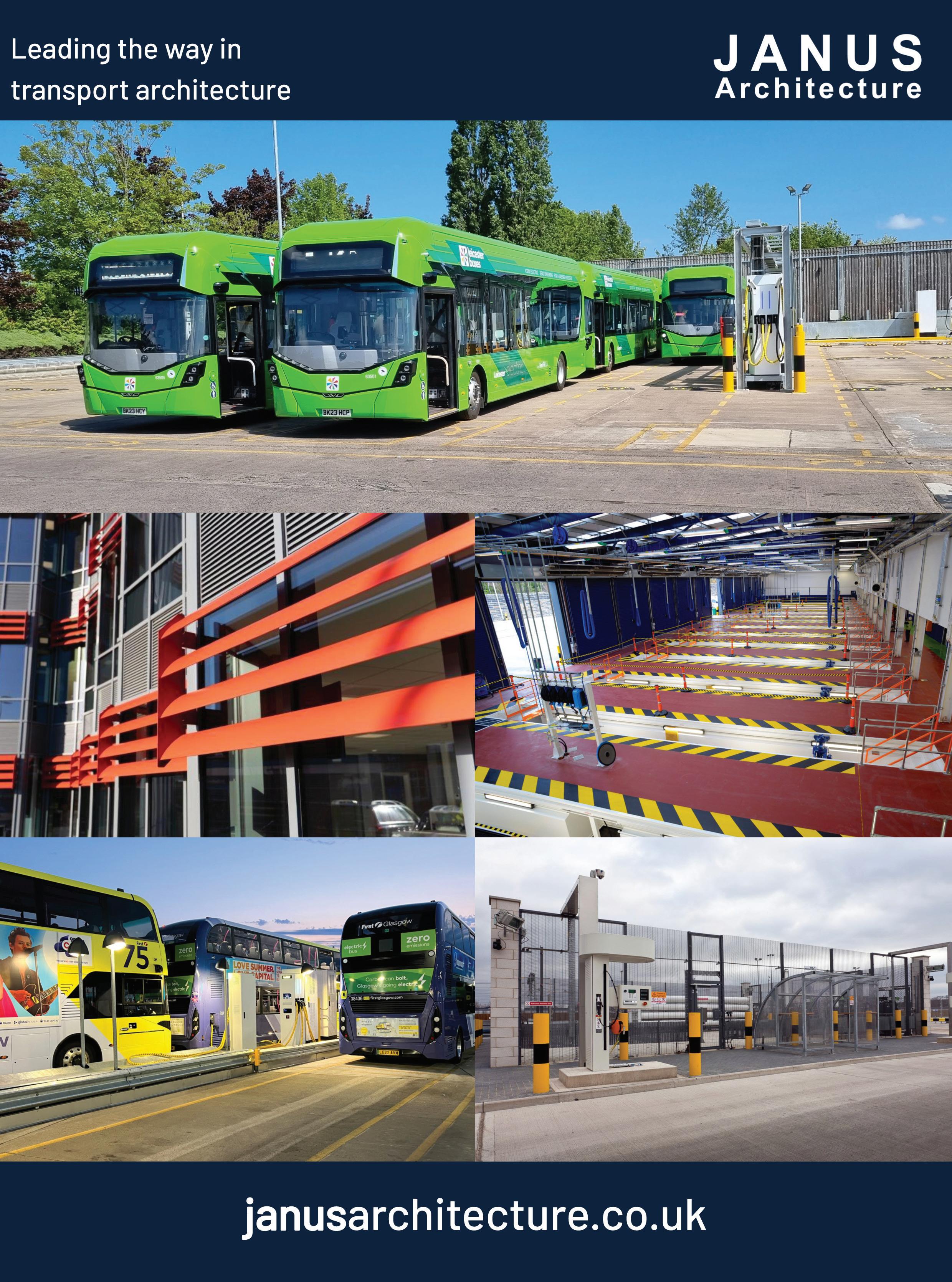
RIDE2RAIL boosts multi-modal travel
When talking about fighting private car ownership, integrated and multi-modal travel - or Mobility as a Service (MaaS) - can’t be missing from the discussion. The integration of different transport services into one single mobility offer in which public transport is at the epicentre, has long been considered a main solution for changing customer behaviour towards more sustainable options.
From this premise, RIDE2RAIL launched in 2019: a project under the helm of UITP (the International Association of Public Transport) and funded by the Europe’s Rail Joint Undertaking. RIDE2RAIL’s main goal was to tackle the question of how to best combine shared modes - especially ride-sharing - with public transport to reduce private car ownership and make efficient use of vehicles’ capacity.

Over the last three and a half years, RIDE2RAIL sought to create solutions enabling passengers to easier combine the train, tram or bus, with ride sharing. On April 27, 2023, the project held its Final Event in Brussels, welcoming UITP, Europe’s Rail, Thales, EURECAT, University of Newcastle, Fit Consulting and many others.
Ride-sharing as a solution to rural mobility challenges
Ride-sharing, if properly implemented, has the potential to reduce the number of cars on the road. Especially in rural areas, where commuting distances are higher and public transport cannot always operate efficiently, ride-sharing can be seen as a solution to fight private car ownership and reduce single-car occupancy rates.
Gathering 17 partners from 10 countries, RIDE2RAIL created solutions and tools that enable people to compare and choose between multiple transport options and services based on travel time, comfort, cost and environmental impact.
“While mass public transport is the backbone of mobility systems in our cities, combined mobility is an unmissable tool in providing the flexibility people are looking for in public transport,” says UITP project co-ordinator Giuseppe Rizzi. “The RIDE2RAIL project capitalised on this complementarity between the different modes of transport and provided an even more accessible and flexible mobility from door to door.”
TravelCompanion and DriverCompanion applications
RIDE2RAIL contributed to make ridesharing a complementary transport mode that extends public transport and in particular rail, becoming a feeder for public transport especially in rural and low demand areas.
One of the objectives of RIDE2RAIL was to further enhance the Travel Companion, a travel application developed by the Shift2Rail Joint Undertaking under its IP4 programme, a framework which wants to create an ecosystem that allows seamless, multi-modal travel across Europe. Alongside RIDE2RAIL, various other projects are involved in IP4. The IP4MaaS project, which ran almost simultaneously to RIDE2RAIL and is also coordinated by UITP, is currently analysing and testing the available IP4 technologies and solutions.
For the Travel Companion, RIDE2RAIL developed the following tools, integrated in the above mentioned ecosystem: Offer Categoriser: this module ‘scores’ the proposed travels/journeys on different
categories such as speed, reliability, pricing, making it easier for passengers to make a choice.
Offer Matcher & Ranker + Incentive Provider: through a machine learning mechanism, this functionality learns the passengers’ travel preferences (in terms of number of changes, overall travel time, etc.) and ranks trips accordingly when searching for a travel solution on the Travel Companion.
Crowd-based Travel Service Provider: a system that publishes available shared rides, and that allows a driver to make visible on the Travel Companion the available seats in his/ her car.
Driver Companion: an application enabling car drivers to share their rides with other passengers. This application is linked to the above mentioned CB TSP.
Agreement Ledger: a tool that supports the secure storing of travel-related records using blockchain ensuring transparency and trust of operations.
RIDE2RAIL solutions were tested in four cities in Europe: Padua, Brno, Athens, and Helsinki: soon a complete UITP Project Brief will be launched, highlighting results from all demo sites.
Gorazd Marinic, programme manager at Europe’s Rail Joint Undertaking comments: “Since 2015, Shift2Rail, now Europe’s Rail Joint Undertaking, has been co-funding research and innovation activities that aim at improving, with the use of Information Technology, the services that are provided to passengers in door-to-door, intermodal journeys. With its piloting activities across the EU, Ride2Rail is providing valuable insights on the real-life use and market potential of the solutions developed within Innovation Programme 4 of Shift2Rail.”
EXPLORE IP4 SOLUTIONS AT
THE UITP SUMMIT
Curious to explore IP4 solutions used in RIDE2RAIL for yourself? From June 4 to 7, Europe’s Rail will showcase the Travel Companion app on its booth at the UITP Global Public Transport Summit in Barcelona. Furthermore, on June 6, the IP4MaaS project organises its Final Event where it will dive deeper into the topic of multimodal services integration.
MORE ONLINE www.uitpsummit.eu www.ride2rail.eu
www.ip4maas.eu
SPECIAL REPORT RIDE2RAIL
UITP-led project has brought together public transport and ride-sharing to improve seamless multi-modal travel across Europe
34 | 2 June 2023 Brought to you by PassengerTransport
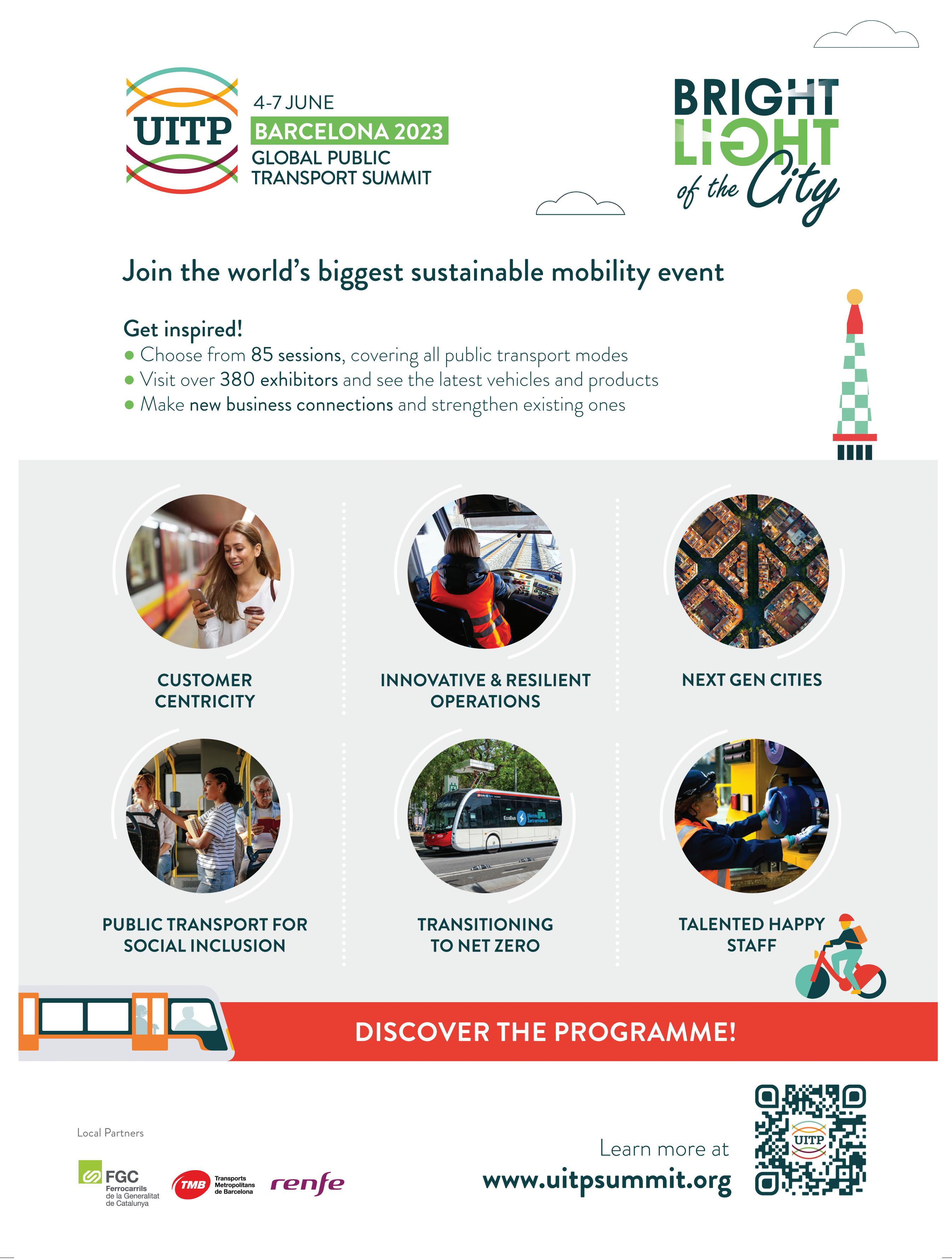
ENERGY MARKET REPORT
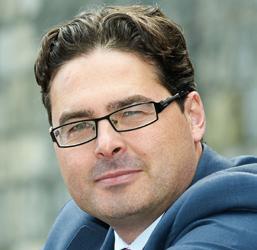
Can carbon capture cut climate change?
Over the last two months we have been on a renewables journey, firstly looking at solar and then wind power. We established that both forms of energy were viable from a commercial and environmental perspective, but also that the industrial processes involved in production were carbon intensive. This means that if we are to build these facilities at speed, then CO2 emissions will continue to rise - bad news considering the increasingly tangible effects of climate change. The requirement then for effective Carbon Capture, Utilisation and Storage (CCUS) is now pressing to a point, where arguably, it is the most important part of the environmental equation.
Unlike the development of renewable energy, the capture and storage of CO2 can never be a profitable enterprise, because the process simply involves the removal of CO2 from the atmosphere (at significant cost), followed by CO2 storage ad infinitum. This means that CCUS can only ever work as a mandated obligation or via taxation. An obligation would mean that governments force CO2 emitters to build carbon sequestration facilities, as part of their “licence to operate”. This is unlikely to work as emitters (industrial complexes, factories, power-stations, refineries) will simply “up-sticks” to countries where there are no CCUS requirements. A more realistic approach would be to fund CCUS via carbon
taxation, whereby producers and sellers of products generating CO2 would be taxed.
It is probably appropriate at this point to ask how feasible carbon capture is and whether even it is a real “thing”? As subject matter it is much talked about, but even the most developed projects are far from operational and cynics will point out that effective carbon capture has long been promised, but never delivered. Just because things have not yet worked however, does not mean they never will. Furthermore, one rather surprising paradox is that the technology behind CCUS is not only well established, but regularly used in the oil industry itself!
“Enhanced oil recovery” involves the pumping of CO2 into depleted oil reservoirs to increase the crude yield of mature oil fields. This has led some “innovative” oil companies to start talking about the prospect of “net-zero” oil, whereby the amount of CO2 produced in production is matched by the same amount pumped into a depleted reservoir. Understandably, this is difficult for many to swallow, but it is surely a good thing that taking CO2 and pumping it into underground reservoirs isn’t actually a new development. And for the moment, there is no shortage of reservoirs to pump the CO2 intoover one million oil wells in the USA alone!
This knowledge and confidence in the technology available has stimulated significant development, with new CCUS projects springing up across the world. In the UK, the
six million tonne Clean Gas Project on Teesside has BP, ENI, Equinor, Occidental, Shell and Total aiming to gather industrial CO2, compress it and then either sell it (to those industries that use CO2) or store it in reservoirs under the North Sea. The Humber Industrial Cluster Plan (HICP) involves the likes of P66, British Steel, Drax and Centrica and aims to do pretty much the same thing, this time using the depleted Viking Gas Field off the Yorkshire Coast. Other similar sized projects are also now under construction across Europe, North America and Australia. It is inconceivable that the multi-nationals involved in these ventures would invest millions of pounds in something they don’t believe will work and whatever their motivations (and of course they vary), their intent means that CCUS will become a “thing”.
A more problematic issue is that most facilities will not be removing and storing CO2 until late into this decade, which speaks directly to the slow work of decarbonisation versus the potentially quicker work of climate change. The International Energy Agency has also predicted that over 2,000 CCUS facilities will be required globally by 2040 to meet COP21 climate targets, but at present there are still only 19 industrial sized plants in development across the world. There are also concerns that the CCUS operational model is unsustainable in the longer-term. Each year the world generates CO2, which has to be removed and stored. But in the same way that oil exploration constantly has to find new oil wells to maintain its status quo, constant new CO2 reservoirs will also need to be found to continue storing CO2.
We shouldn’t lose sight of the fact that there is no single “silver bullet” in the decarbonisation conundrum and only the reduction of CO2 emissions will provide a long-term solution to the problems of climate change. Nonetheless, CCUS can act as a brake in the cycle and as a result will inevitably become a key component in greening the global economy. The modern world requires steel, concrete and other heavy industries and as long as this is the case, copious amounts of CO2 will be generated. Emissionless energy, carbon-free concrete, green steel and renewable plastics are all possible, but they are further down the track than CCUS. On that basis, if we want a low-carbon but modern economy, then heavy investment in carbon capture is going to be required.
COMMENT WANT TO KNOW MORE? Visit Portland’s fuel forum page: portland-analytics.co.uk/fuel-forum
PORTLAND FUEL ANALYTICS -JUNE 2023
If we want a low-carbon but modern economy, heavy investment in Carbon Capture, Utilisation and Storage (CCUS) is necessary
36 | 2 June 2023 www.passengertransport.co.uk
James Spencer Portland
GREAT MINSTER GRUMBLES

No time for a rail Bill this Autumn?

Our Whitehall insider imagines what’s going on inside the minds of the mandarins at Great Minster House, home of the DfT
So it’s official. There will be no Rail Bill in the next parliamentary session. Or rather, it’s official if you believe the report in The Times that Rishi Sunak has decided that rail legislation is not a priority and so no parliamentary time will be made available for a rail Bill. And, based on what our minister of state, Jesse Norman, had to say to the Transport Select Committee recently, it seems there may not be a “future transport” Bill dealing with autonomous vehicles and e-scooter issues either.
Mind you, readers of this column shouldn’t be surprised. I’ve suggested more than once that a rail Bill, and even a “future transport” Bill, was looking increasingly unlikely. That said, my understanding is that the report in The Times is a touch premature, as no decisions have yet been taken on the content of the legislative programme for the next parliamentary session. My hunch is that the current uncertainty is that ministers have to decide which is their priority - rail legislation or legislation on e-scooters and autonomous vehicles. After all the time, effort and money that’s gone into the rail review, you would like to think it’s the former, but I’m not holding my breath. Life would be so much simpler if we could just be given a general transport Bill and be done with it.
I am also hearing that the decision to bring TransPennine Express under the wing of Directly Operated Railways was taken by Rishi Sunak, and that official advice was actually to extend its contract, not to terminate it. It seems that political considerations outweighed
official advice. Perhaps our prime minister is happy to see all passenger service contracts come back under public sector control, using the not unreasonable argument that operators are largely not responsible for most issues that cause poor performance - so does it really matter if passenger services are run by the private or public sectors. If that’s the thinking, rail privatisation is officially dead. Meanwhile, Network Rail has published its strategic plan for Control Period 7. Parts of it make for alarming reading. It seems to me to confirm the recent reports that Network Rail had concluded that the effects of inflation would mean that the CP7 funding settlement would result in a deterioration of its assets.
Let me quote from the strategic plan: “We have an ageing asset base and a growing number of these assets are reaching ‘end of life’. Given how we have prioritised and allocated available funding to deliver our objectives, we expect that asset condition and performance will be impacted over CP7.” So a growing number of assets are reaching end of life and performance is going to be “impacted”. Put into plain English, that means asset condition is going to get worse.
We pour hundreds of billions into a brandnew railway - HS2 - when the condition of the existing railway is deteriorating. Does this sound like sensible policy to you?
On to other matters. Remember the Acceleration Unit, set up by our former transport secretary, Grant Shapps, to much fanfare in August 2020? The unit, led by Darren Shirley and supported by an expert panel, was going to do all sorts of good work to ensure that projects were delivered more quickly. How many of you have actually had any sight of the work of the Acceleration Unit? How many of you actually know what it has done to ensure that projects are delivered more quickly? I’m guessing that would be none of you. The Acceleration Unit was about as invisible as it is possible for an arm of government to be. I suspect most of you had forgotten all about it!
I make the point because Darren Shirley has now left to join the Urban Transport Group, and I’m told the unit has been wound up after just three years. To my knowledge, we have had no public reports on its work, no evidence of which projects actually benefited from its activity and zero exposure to anything it has ever done. Ministers will doubtless say that the decision to wind up the unit is because its work is done, that thanks to its advice we now know how to speed up projects and deliver them on time. Really? Perhaps a minister could stand up and actually explain what advice the unit has given and what lessons have been learnt from its work.
I can’t help but conclude that the creation of the Acceleration Unit was a Grant Shapps political stunt to try and get some short-term political headlines that he was sorting out the age-old problem of project delays. A rail review that might be hitting the buffers and an Acceleration Unit that has been wound up after just under three years. Some legacy, Grant!
COMMENT
“Life would be so much simpler if we could just be given a general transport Bill”
www.passengertransport.co.uk 2 June 2023 | 37
Women in Rail award winner
Open access operator Hull Trains named Top Employer at this year’s Women in Rail Awards
Open access train operator
Hull Trains emerged as the standout winner at the prestigious Women in Rail Awards, securing the coveted title of Top Employer of the Year.

The award reflects the commitment of Hull Trains to fostering an inclusive culture that prioritises the attraction and retention of female talent. The operator received accolades for its efforts in cultivating a new generation of female leaders and its unwavering dedication to promoting equality, diversity, and inclusion in the workplace.
Having been shortlisted in March, Hull Trains proudly lifted the trophy during the awards ceremony held in London last month. The company has demonstrated remarkable resilience and progress this year, overcoming challenges posed by the pandemic. Their achievements were previously recognised at the Golden Spanner
Hull Trains was named the winner in London last month
Awards, commending their service reliability, as well as at the Hull BID Awards, honoring their strong leadership.
The Women in Rail Awards are widely viewed as a benchmark within the industry, showcasing companies that make significant contributions to enhancing gender balance, diversity, and inclusion in the rail sector.
Hull Trains won the title as a result of some impressive statistics - 32% of their drivers are female, the highest percentage in the UK rail industry. In comparison, the industry average stands at just 6.5% according to 2021 statistics. Additionally, the company boasts a 50/50 gender split across its executive board and 48% of its total workforce comprises women.
“This recognition feels like a seal of approval for the work we’re doing to create an inclusive and diverse work environment,” said Hull Trains managing director Martijn Gilbert.
APPOINTMENTS
NORTHERN RAIL
Northern Rail has announced two senior management appointments.
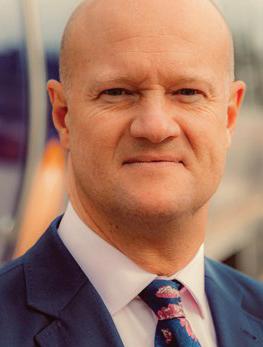
Craig Harrop has been appointed interim regional director for Northern in the North West whilst Kerry Peters will move to take up the role of regional director for Yorkshire, East Midlands and Humberside this summer.
Harrop (pictured) was latterly head of trains and stations for Lancashire, Merseyside and Cumbria. He succeeds Chris Jackson, who has recently been appointed the new interim managing director for TransPennine Express as the company prepares to be taken over by the government’s Operator of Last Resort.
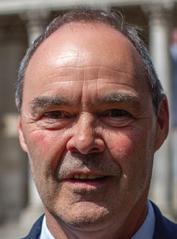
Peters will move to the North East region, where she has served as regional director since 2020, to take up her new position. Originally joining Northern in 2017, Peters spent several years as business manager at Virgin Cross Country.
PORTSMOUTH CITY COUNCIL
Portsmouth City Council has announced the appointment of Keith Willcox as transport advisor to assist rolling out high profile transport schemes within the city, including the city’s ambitious Bus Service Improvement Plan (BSIP).
Willcox (pictured) joins on a part time basis, bringing a wealth of transport industry knowledge and experience following a 40-year career in the transport industry. In his new role he will support a wide range of initiatives.
WOMEN IN RAIL
Women in Rail has appointed five new trustees to its governing board. Shona Clive, vice-chair of Women in Rail made the announcement at the Women in Rail Awards last month.
The new trustees are Angie Doll, Sharon Salmon, Darren O’Brien, Karen Paton and Neil Robertson. Clive said all five trustees are passionate supporters of Women in Rail which was founded in 2012 to improve diversity in the UK rail industry.
Angie Doll is chief operating officer of Govia Thameslink Railway. With over 20 years’ experience in the rail industry, Doll is an advocate for diversity in the workplace and is a champion for women in rail.
Sharon Salmon is supplier manager (corporate services) for Network Rail. She has previously chaired Network Rail’s black, Asian and minority ethnic employee network aimed at recognising the benefits of a diverse workforce.
Darren O’Brien is deputy head of retail for Southeastern. During the Covid pandemic, O’Brien is credited for initiating ‘Rail to Refuge’, an initiative aimed at securing free train tickets anyone escaping domestic abuse.
Karen Paton is onboard manager, Glasgow for Avanti West Coast. She received Women in Rail Awards 2021 Inspirational Woman of the Year Award, and also served on the Judging Panel for 2022.
Meanwhile, Neil Robertson is the chief executive of NSAR, joining the organisation in 2015 following senior roles in both the utility and hospitality sectors. An avid supporter of Women in Rail for many years, he has served as a Women in Rail Awards judge.
CAREERS 38 | 2 June 2023 www.passengertransport.co.uk
Rail industry job swap pilot launched
Network Rail and Arriva Rail London pioneer groundbreaking senior-level job swap scheme in move that aims to enhance greater collaboration
In a groundbreaking move, Network Rail and Arriva Rail London (ARL) have collaborated to facilitate a job swap at the senior level. It is hoped that such initiatives will be expanded in the future.
In August Matt Pocock, the operations director at ARL, will embark on an 18-month secondment as the operations director for Network Rail’s Wessex route. Simultaneously, Gunnar Lindahl, currently serving as Network Rail’s Wessex route operations director, will assume
Pocock’s role at ARL.
The swap between ARL and Network Rail signifies a commitment to investing in and developing their respective teams.
It also recognises the increasing need for closer collaboration between track and train operations as the rail industry moves towards Great British Railways.
Pocock and Lindahl bring their skill sets to their new roles and the hope is they will contribute fresh insights and approaches to their temporary organisations.
It is hoped that the experience gained during the exchange will prove invaluable when the two executives return to their original positions, enriching Network Rail and ARL with expertise in managing both infrastructure and train service operations.

“The opportunity to work in partnership with ARL to grow our leaders’ whole system knowledge of the industry was an easy decision,” said Ellie Burrows, regional managing director for Network Rail’s Southern region. “There is never a bad time to listen, learn and improve and learning from each other and sharing this knowledge will undoubtedly mutually benefit both organisations.”
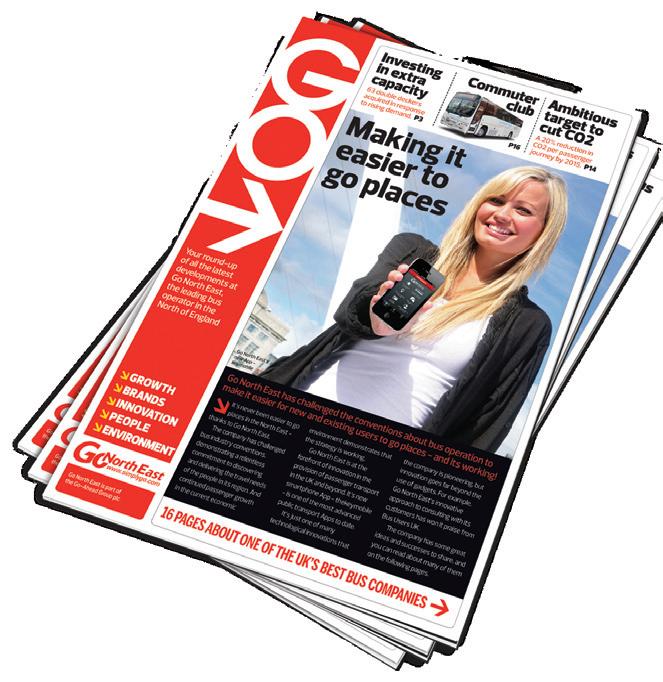
CALL NOW TO ADVERTISE 020 3950 8000 or email sales@passengertransport.co.uk www.passengertransport.co.uk 2 June 2023 | 39
To advertise, call now 020 3950 8000 or email the team at sales@passengertransport.co.uk ADD YOUR JOBS HERE Contract Publishing Our experienced team of transport and publishing experts are available to produce bespoke, high quality publications or copywriting for your organisation. Our rates are very affordable. Email editorial@ passengertransport.co.uk or call 020 3950 8000 to find out more.
Gunnar Lindahl (left) and Matt Pocock
Appeal to restore veteran T357 coach
Twenty years ago a derelict 1931 Green Line coach which had seen military service in Europe during World War II returned to UK and is now on display at the London Bus Museum, Brooklands. Now a campaign has been launched to raise funds to restore the coach.
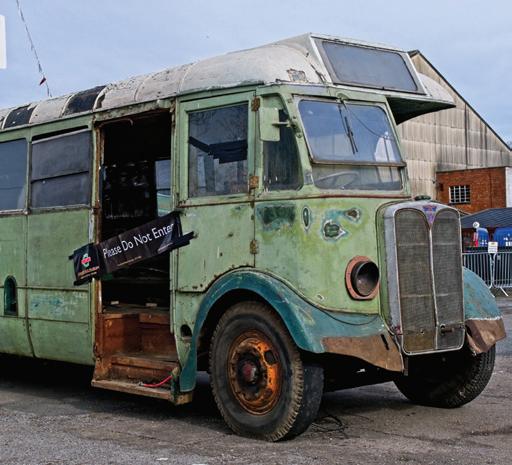
In 1931 Queen Line Coaches of Baldock bought some AEC Regal single-decker coaches for their service to London.
By 1933 these coaches had passed to the London General Omnibus Company and appeared in Green Line livery. In 1935 their fragile bodies were replaced by new ones from Metro-Cammell Weymann at Addlestone and so then ran as coaches, and eventually as buses in the Weybridge area.
The shortage of petrol during World War II saw the coaches converted to run on ‘producer gas’. In effect an anthracite-burning trailer was towed behind the bus. Everything continued as normal until the Ministry of War Transport called for vehicles to serve with the Allied Control Commission in war-ravaged Europe. One of the
WAITROSE’S LOSS IS NXWM’S GAIN
National Express West Midlands boss David Bradford gave a fascinating state-of-the-nation talk to the Young Bus Managers Network last week, but how did he end up working on the buses?
SUBSCRIPTION ORDER FORM
vehicles sent was T357 - the last of this batch of vehicles.
Very little is known other than after service in Berlin it was donated as a community transport bus to a French village near the Belgian border. However in 2003 it was rescued by volunteers.
£350,000 is needed to restore this unique vehicle and London Bus Museum is fundraising. Applications are being made to institutions but at least half will need to be raised by individual and corporate donations. The museum would really appreciate contributions large or small.
Single donations are easy online at www.londonbusmuseum.com/ t357-appeal/.
Organisations wanting to discuss sponsorship please contact Leon Daniels at leon.daniels@ londonbusmuseum.com.
“The reason I’m in the bus industry is that the 52 places I applied to go to before I got the job at FirstGroup rejected me,” he joked. “Sainsbury’s said I wasn’t very clever; Tesco said I was psychologically unsuitable; Waitrose - I still haven’t shopped in Waitrose for 19 years - said I was ‘too far outside the box’. So I ended up here by accident.”
FANCY A BEER?
Thirsty East Coast travellers can now enjoy a local brew on Lumo. The open access operator has partnered with Donzoko Brewing Company to create ‘Train Beer’ a delicious dry-hopped crisp pale ale with notes of peach, pine, and gooseberry. Cheers!

BOB BOWS OUT FROM THE BUSES
National Express West Midlands has bid a fond farewell to its longest-serving employee after an incredible 56 years of loyal service.
Bob Smith joined the company as a bus conductor in 1967 when he was just 18. From the age of 21 he then spent the next 54 years driving hundreds of thousands of bus passengers and colleagues around the West Midlands.
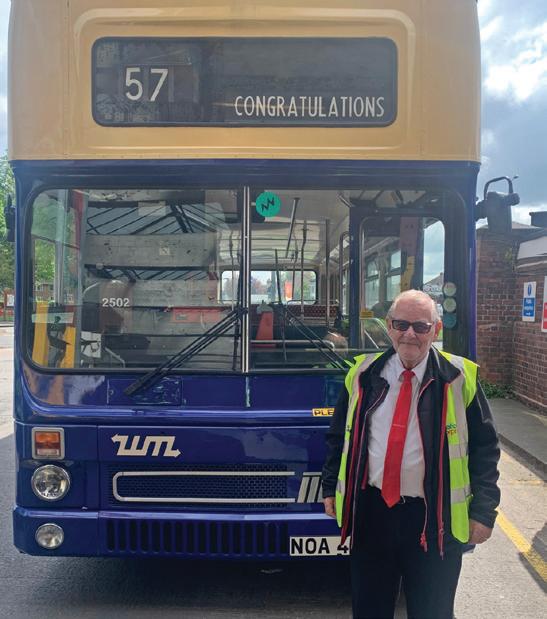
“I’d like to thank Bob for his dedication over the years,” said operations manager Mat Dale. “He’s been a brilliant driver which was proven by his recent Master Driver status, and his knowledge and experience of the roads was unrivalled!”
SEEN SOMETHING QUIRKY?
Why not drop us a line at editorial@passengertransport.co.uk
Bob’s off the buses
All annual subscription rates include delivery by secondclass post, or airmail for overseas. Please Note: EU subscriptions may be subject to import duties and taxes. Subscribers will be liable for payment of any such charges. ANNUA L SU BSCRIPTION R ATES 1 year UK: £140 EU & Rest of World: £280 2 year UK: £250 3 year UK: £375 WWW.PASSENGERTRANSPORT.CO.UK N A M E JOB TITLE CO M PANY ADDRESS POSTCODE TEL E M AIL DATE PLEASE START MY SUBSCRIPTION TO PASSENGER TRANSPORT CARD NU M BER SECURITY CODE EXPIRY DATE SIGNATURE I enclose a cheque for £ made payable to Passenger Transport Publishing Limited Please invoice my company (official order enclosed) I authorise you to debit my M astercard/VISA/ M aestro/VISA Electron card. Amount £ PT290 Email: subs@passengertransport.co.uk Return to: Subscriptions, Passenger Transport Publishing Ltd, PO Box 5496, Westbury BA13 9BX
Museum seeks £350,000 for unique vehicle
The vehicle was rescued in 2003
DIVERSIONS 40 | 2 June 2023 www.passengertransport.co.uk
Lumo’s Martijn Gilbert with Reece Hugill from Donzoko































 The technology roadmap for zero emission local bus was a significant step forward
The technology roadmap for zero emission local bus was a significant step forward


















